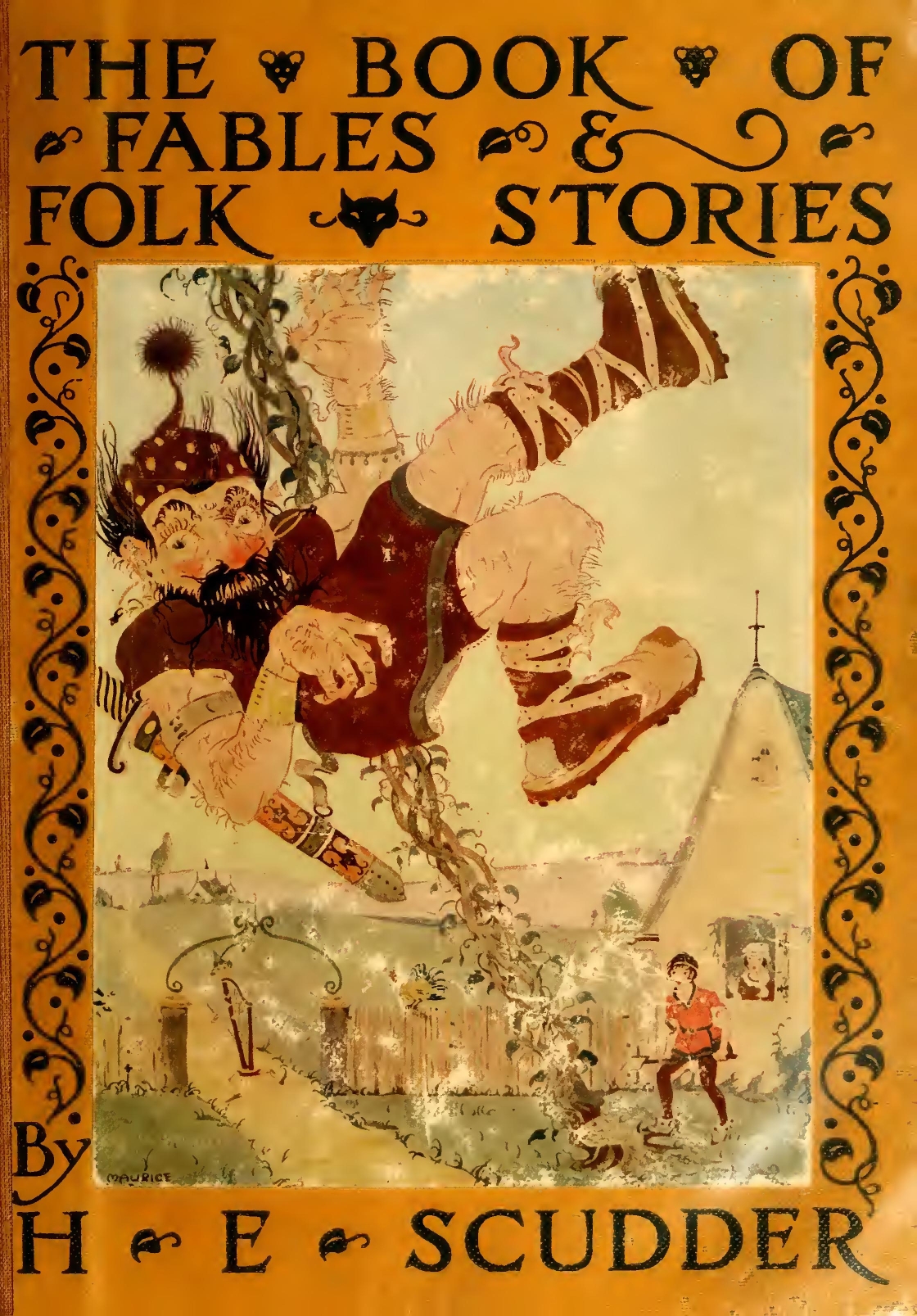
Project Gutenberg's The Book of Fables and Folk Stories, by Horace E. Scudder This eBook is for the use of anyone anywhere at no cost and with almost no restrictions whatsoever. You may copy it, give it away or re-use it under the terms of the Project Gutenberg License included with this eBook or online at www.gutenberg.org Title: The Book of Fables and Folk Stories Author: Horace E. Scudder Release Date: April 14, 2014 [EBook #45384] Last Updated: November 19, 2016 Language: English Character set encoding: UTF-8 *** START OF THIS PROJECT GUTENBERG EBOOK BOOK OF FABLES *** Produced by David Widger from page images generously provided by the Internet Archive

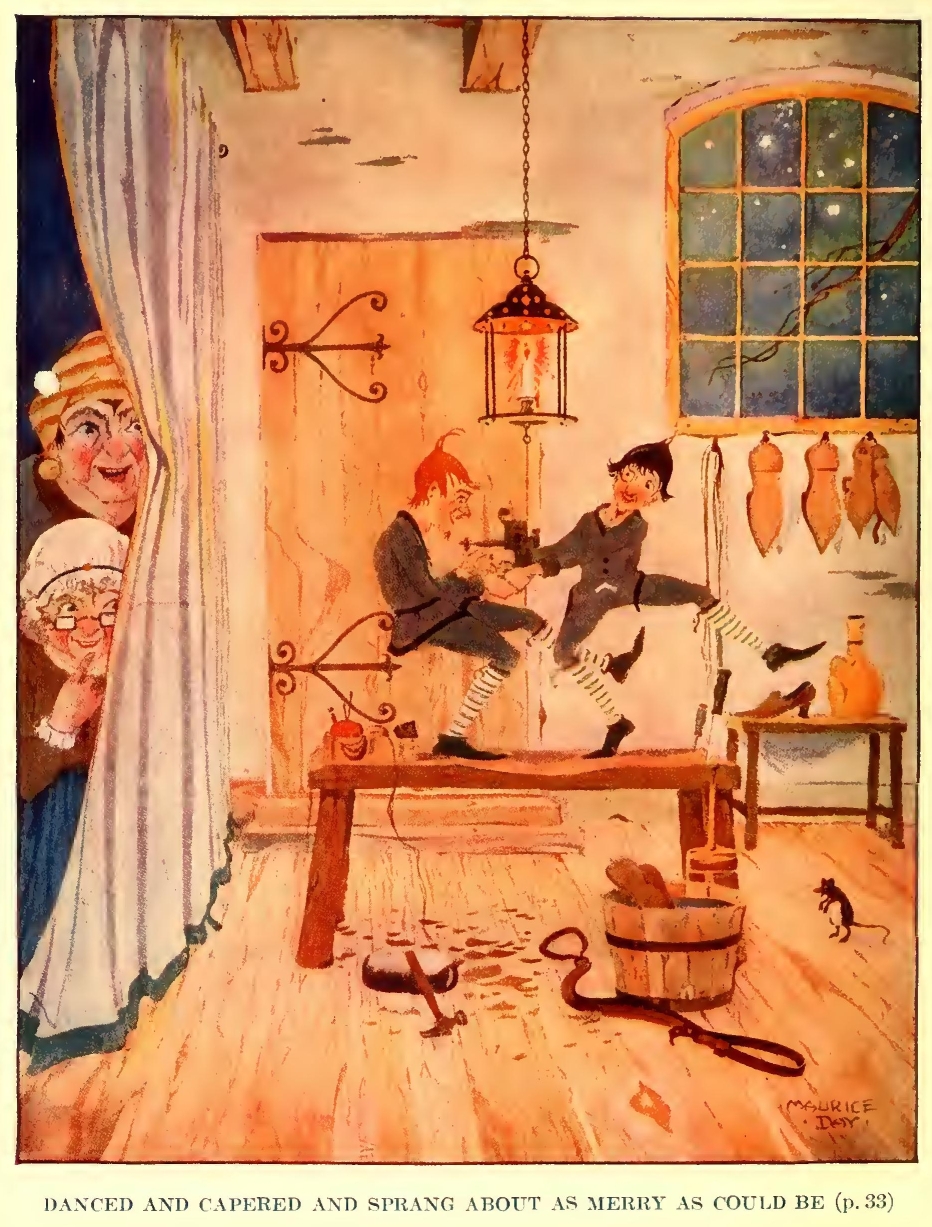
CONTENTS
THE BOOK OF FABLES AND FOLK STORIES
THE GOOSE THAT LAID GOLDEN EGGS
LITTLE ONE EYE, LITTLE TWO EYES, AND LITTLE THREE EYES
A COUNTRY FELLOW AND THE RIVER
THE SPENDTHRIFT AND THE SWALLOW
THE MILLER, HIS SON, AND THEIR ASS
CINDERELLA, OR THE GLASS SLIPPER
THE COUNTRY MOUSE AND THE TOWN MOUSE
THE SLEEPING BEAUTY IN THE WOOD
THE CAT, THE MONKEY, AND THE CHESTNUTS
THE FLIES AND THE POT OF HONEY
THE LION, THE ASS, AND THE FOX
THE COUNTRY MAID AND HER MILK-PAIL
THE CAT, THE WEASEL, AND THE YOUNG RABBIT
For more than a generation Mr. Scudder’s Book of Fables and Folk Stories has been a prime favorite with young readers. It has seemed to the publishers that a book which has maintained its popularity so long might well be furnished with illustrations more in accordance with the taste of the present day than those which were originally used. All the old pictures have therefore been replaced by drawings made by a modern artist, and it is hoped that readers of the volume will find its old charm heightened by this new feature.
4 Park St., Boston October, 1919
Once upon a time there lived in a certain village a little girl. Her mother was very fond of her, and her grandmother loved her even more. This good old woman made for her a red cloak, which suited the child so well that ever after she was called Little Red-Riding-Hood. One day her mother made some cakes, and said to Little Red-Riding-Hood:—
“Go, my dear, and see how grandmother does, for I hear that she has been very ill. Carry her a cake and a little pot of butter.”
Little Red-Riding-Hood set out at once to go to her grandmother, who lived in another village. As she was going through the wood she met a large Wolf. He had a very great mind to eat her up; but he dared not, for there were some wood-choppers near by. So he asked her:—
“Where are you going, little girl?” The poor child did not know that it was dangerous to stop and talk with the Wolf, and she said:—
“I am going to see my grandmother, and carry her a cake and a little pot of butter from my mother.”
“Does she live far off?” asked the Wolf.
“Oh, yes. It is beyond that mill, at the first house in the village.”
“Well,” said the Wolf, “I will go and see her, too. I will go this way; do you go that, and we will see who will be there soonest.”
At this the Wolf began to run as fast as he could, taking the nearest way, and Little Red-Riding-Hood went by the farthest. She stopped often to chase a butterfly, or pluck a flower, and so she was a good while on the way. The Wolf was soon at the old woman’s house, and knocked at the door—tap, tap!
“Who is there?”
“Your grandchild, Little Red-Riding-Hood,” replied the Wolf, changing his voice. “I have brought you a cake and a pot of butter from mother.” The good grandmother, who was ill in bed, called out:—
“Pull the string, and the latch will go up.” The Wolf pulled the string, and the latch went up. The door opened, and he jumped in, and fell upon the old woman, and ate her up in less than no time, for he had not tasted food for three days. He then shut the door, and got into the grandmother’s bed. By and by, Little Red-Riding-Hood came and knocked at the door—tap, tap!
“Who is there?”
Little Red-Riding-Hood heard the big voice of the Wolf, and at first she was afraid. Then she thought her grandmother must have a bad cold, so she answered:—
“Little Red-Riding-Hood. I have brought you a cake and a pot of butter from mother.” The Wolf softened his voice as much as he could, and called out:—
“Pull the string, and the latch will go up.” Little Red-Riding-Hood pulled the string, and the latch went up, and the door opened. The Wolf was hiding under the bedclothes and called out in a muffled voice:—
“Put the cake and the pot of butter on the shelf, and come to bed.”
Little Red-Riding-Hood made ready for bed. Then she looked with wonder at her grandmother, who had changed so much, and she said:—“Grandmother, what great arms you have!”
“The better to hug you, my dear.”
“Grandmother, what great ears you have!”
“The better to hear you, my dear.”
“Grandmother, what great eyes you have!”
“The better to see you, my dear.”
“Grandmother, what great teeth you have!”
“The better to eat you.”
And at this the wicked Wolf sprang up and fell upon poor Little Red-Riding-Hood and ate her all up.
There was a man who once had a Goose that always laid golden eggs, one every day in the year.
Now, he thought there must be gold inside of her. So he wrung her neck and laid her open.
He found that she was exactly like all other geese. He thought to find riches, and lost the little he had.
This fable teaches that one should be content with what one has, and not be greedy.

A Dog once made his bed in a manger. He could not eat the grain there, and he would not let the Ox eat it, who could.
A hungry Fox found some bunches of grapes upon a vine high up a tree. He tried to get at them, but could not. So he left them hanging there and went off, saying to himself:—
“They are sour grapes.”
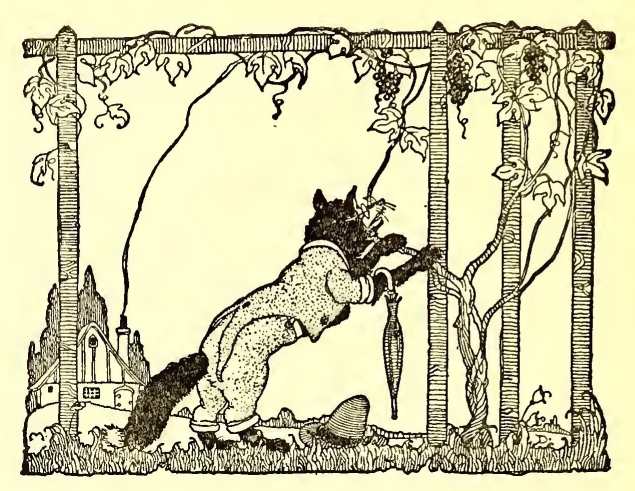
That is what people sometimes do when they cannot get what they want—they make believe that what they want is good for nothing.
There was once a woman who had three daughters. The eldest was called Little One Eye, because she had only one eye in the middle of her forehead. The second was called Little Two Eyes, because she had two eyes like other people. The youngest was called Little Three Eyes, because she had three eyes; the third eye was in the middle of her forehead.
Because Little Two Eyes looked like other people, her sisters and her mother could not bear her. They said:—
“You have two eyes and are no better than anybody else. You do not belong to us.” They knocked her about, and gave her shabby clothes, and fed her with food left over from their meals.
One day Little Two Eyes was sent into the fields to look after the goat. She was hungry, because her sisters had given her so little to eat, and she sat down and began to cry. She cried so hard that a little stream of tears ran out of each eye. All at once a wise woman stood near her, and asked:—
“Little Two Eyes, why do you cry?” Little Two Eyes said:—
“Have I not need to cry? Because I have two eyes, like other people, my sisters and my mother cannot bear me. They knock me about and they give me shabby clothes. They feed me only with the food left over from their table. To-day they have given me so little that I am very hungry.”
The wise woman said:—
“Little Two Eyes, dry your eyes, and I will tell you what to do. Only say to your goat: ‘Little goat, bleat; little table, rise,’ and a table will stand before you, covered with food. Eat as much as you like. When you have had all you want, only say: ‘Little goat, bleat; little table, away,’ and it will be gone.” Then the wise woman disappeared. Little Two Eyes thought: “I must try at once, for I am too hungry to wait.” So she said:—
“Little goat, bleat; little table, rise,” and there stood before her a little table covered with a white cloth. On it were laid a plate, knife and fork, and silver spoon. The nicest food was on the plate, smoking hot. Then Little Two Eyes began to eat, and found the food very good. When she had had enough, she said:—
“Little goat, bleat; little table, away.” In an instant the table was gone.
“That is a fine way to keep house,” thought Little Two Eyes.
At the end of the day Little Two Eyes drove her goat home. She found a dish with some food in it. Her sisters had put it aside for her, but she did not taste it. She did not need it.
The next day she went out again with her goat, and did not take the few crusts which her sisters put aside for her. This went on for several days. At last her sisters said to each other:—
“All is not right with Little Two Eyes. She always leaves her food. She used to eat all that was given her. She must have found some other way to be fed.”
They meant to find out what Little Two Eyes did. So the next time that Little Two Eyes set out, Little One Eye came to her and said:—
“I will go with you into the field, and see that the goat is well taken care of, and feeds in the best pasture.” But Little Two Eyes saw what Little One Eye had in her mind. So she drove the goat into the long grass, and said:—
“Come, Little One Eye, we will sit down and I will sing to you.” Little One Eye sat down. She was tired after her long walk in the hot sun, and Little Two Eyes began to sing:—
“Are you awake, Little One Eye? Are you asleep, Little One Eye? Are you awake, Little One Eye? Are you asleep, Little One Eye? Are you awake? Are you asleep? Awake? Asleep?” By this time Little One Eye had shut her one eye and was fast asleep. When Little Two Eyes saw this, she said softly:—
“Little goat, bleat; little table, rise;” and she sat at the table and ate and drank till she had had enough. Then she said as before:—
“Little goat, bleat; little table, away,” and in a twinkling all was gone.
Little Two Eyes now awoke Little One Eye, and said:—
“Little One Eye, why do you not watch? You have been asleep, and the goat could have run all over the world. Come! let us go home.” So home they went, and Little Two Eyes again did not touch the dish. The others asked Little One Eye what Little Two Eyes did in the field. But she could only say:—
“Oh, I fell asleep out there.”
The next day, the mother said to Little Three Eyes:—
“This time you must go with Little Two Eyes, and see if any one brings her food and drink.” Then Little Three Eyes said to Little Two Eyes:
“I will go with you into the field, and see that the goat is well taken care of, and feeds in the best pasture.” But Little Two Eyes saw what Little Three Eyes had in her mind. So she drove the goat into the long grass, and said:—“Come, Little Three Eyes, we will sit down, and I will sing to you.” Little Three Eyes sat down. She was tired after her long walk in the hot sun, and Little Two Eyes began to sing, as before:—
“Are you awake, Little Three Eyes?” but instead of going on,—
“Are you asleep, Little Three Eyes?” she did not think, and sang:—
“Are you asleep, Little Two Eyes?” and went on:—
“Are you awake, Little Three Eyes? Are you asleep, Little Two Eyes? Are you awake? Are you asleep? Awake? Asleep?” By this time the two eyes of Little Three Eyes fell asleep. But the third eye did not go to sleep, for it was not spoken to by the verse. Little Three Eyes, to be sure, shut it, and made believe that it went to sleep. Then she opened it a little way and watched Little Two Eyes.
When Little Two Eyes thought Little Three Eyes was fast asleep, she said softly:—
“Little goat, bleat; little table, rise;” and she sat at the table and ate and drank till she had had enough. Then she said as before:—
“Little goat, bleat; little table, away.” But Little Three Eyes had seen everything. Little Two Eyes now woke Little Three Eyes, and said:—
“Little Three Eyes, why do you not watch? You have been asleep, and the goat could have run all over the world. Come! let us go home.”
So home they went, and Little Two Eyes again did not touch the dish. Then Little Three Eyes said to the mother:—
“I know why the proud thing does not eat. She says to the goat: ‘Little goat, bleat; little table, rise,’ and there stands a table before her. It is covered with the very best of things to eat, much better than anything we have. When she has had enough to eat, she says: ‘Little goat, bleat; little table, away,’ and all is gone. I have seen it just as it is. She put two of my eyes to sleep, but the one in my forehead stayed awake.” Then the mother cried out:—
“Shall she be better off than we are?” With that she took a knife and killed the goat. Poor Little Two Eyes went to the field, and sat down and began to cry. All at once the wise woman stood near her, and asked:—
“Little Two Eyes, why do you cry?” Little Two Eyes said:—
“Have I not need to cry? My mother has killed the goat. Now I must suffer hunger and thirst again.” The wise woman said:—
“Little Two Eyes, dry your eyes, and I will tell you what to do. Beg your sisters to give you the heart of the goat. Then bury it in the ground before the door of the house. All will go well with you.” Then the wise woman was gone, and Little Two Eyes went home and said to her sisters:—
“Sisters, give me some part of my goat. I do not ask for anything but the heart.” They laughed, and said:—
“You can have that, if you do not want anything else.”
Little Two Eyes took the heart and buried it in the ground before the door of the house.
Next morning the sisters woke and saw a splendid tree in front of the house. It had leaves of silver and fruit of gold. It was wonderful to behold; and they could not think how the tree had come there in the night. Only Little Two Eyes knew that the tree had grown out of the heart of the goat. Then the mother said to Little One Eye:—
“Climb up, my child, and pluck some fruit from the tree.” Little One Eye climbed the tree. She put out her hand to take a golden apple, but the branch sprang back. This took place every time. Try as hard as she could, she could not get a single apple. Then the mother said:—
“Little Three Eyes, you climb up. You can see better with your three eyes than Little One Eye can.” Down came Little One Eye, and Little Three Eyes climbed the tree. She put out her hand, and the branch sprang back as it had from Little One Eye. At last the mother tried, but it was the same with her. She could not get a single apple. Then Little Two Eyes said:—
“Let me try.”
“You!” they all cried. “You, with your two eyes like other people! What can you do?” But Little Two Eyes climbed the tree, and the branch did not spring back. The golden apples dropped into her hands, and she brought down her apron full of them. Her mother took them away from her, and her two sisters were angry because they had failed, and they were more cruel than ever to Little Two Eyes.
While they stood by the tree, the Prince came riding near on a fine horse.
“Quick, Little Two Eyes,” said her sisters, “creep under this cask; we are ashamed of you.” And they threw an empty cask over her, and pushed the golden apples under it.
The Prince rode up and gazed at the splendid tree. “Is this splendid tree yours?” he asked of the sisters. “If you will give me a branch from it, I will give you anything you wish.” Then Little One Eye and Little Three Eyes said the tree was theirs, and they would break off a branch for him. They put out their hands, but again the branches sprang back. Then the Prince said:—
“This is very strange. The tree is yours, and yet you cannot pluck the fruit.”
They kept on saying that the tree was theirs, but while they were saying this, Little Two Eyes rolled a few of the apples out from under the cask. The Prince saw them, and asked:—
“Why! where did these golden apples come from? Who is under the cask?” Little One Eye and Little Three Eyes told the Prince that they had a sister.
“But she does not show herself,” they said. “She is just like other people. She has two eyes.” Then the Prince called:—
“Little Two Eyes! come out!” So Little Two Eyes was very glad and crept out from under the cask.
“Can you get me a branch from the tree?”
“Yes,” said Little Two Eyes, “I can, for the tree is mine.” Then she climbed the tree and broke off a branch. It had silver leaves and golden fruit, and she gave it to the Prince. Then the Prince said:—
“Little Two Eyes, what shall I give you for it?”
“Oh,” said Little Two Eyes, “I suffer hunger and thirst all day long. If you would take me with you, I should be happy.”
So the Prince lifted Little Two Eyes upon his horse, and they rode away. He took her to his father’s house and made her Princess, and she had plenty to eat and drink and good clothes to wear. Best of all, the Prince loved her, and she had no more hard knocks and cross words.
Now, when Little Two Eyes rode away with the Prince, the sisters said:—
“Well, we shall have the tree. We may not pluck the fruit, but every one will stop to see it and come to us and praise it.” But the next morning when they went to look at the tree, it was gone.
Little Two Eyes lived long and happily. One day, two poor women came to her, and asked for something to eat. Little Two Eyes looked at their faces and knew them. They were Little One Eye and Little Three Eyes. They were so poor that they were begging bread from door to door. Little Two Eyes brought them into the house and was very good to them. Then they both were sorry for the evil they had once done their sister.
T he Wind and the Sun had a dispute as to which of the two was the stronger. They agreed that the one should be called stronger who should first make a man in the road take off his cloak.
The Wind began to blow great guns, but the man only drew his cloak closer about him to keep out the cold. At last the gust was over.
Then the Sun took his turn. He shone and it was warm and bright. The man opened his cloak, threw it back, and at last took it off, and lay down in the shade where it was cool.
So the Sun carried his point against the Wind.
This fable teaches that gentleness often succeeds better than force.
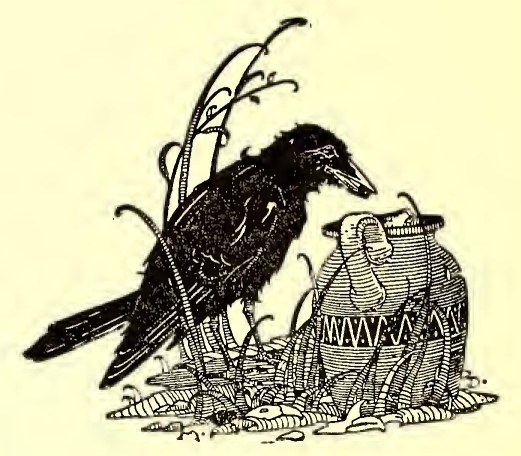
A Crow who was very thirsty found a Pitcher with a little water in it. But the water lay so low that she could not come at it.
She tried first to break the Pitcher, and then to overturn it, but it was too strong and too heavy for her. At last she thought of a way.
She dropped a great many little pebbles into the Pitcher, until she had raised the water so that she could reach it.
A company of Boys were watching some Frogs by the side of a pond, and as fast as any of the Frogs lifted their heads the Boys would pelt them down again with stones.
“Boys,” said one of the Frogs, “you forget that, though this may be fun for you, it is death to us.”
A stupid Boy was sent to market by his Mother to sell butter and cheese. He made a stop by the way at a swift river, and laid himself down on the bank to watch until it should run out.
About midnight, home he went to his Mother, with all his market goods back again.
“Why, how now, my Son?” said she. “What have we here?”
“Why, Mother, yonder is a river that has been running all this day, and I stayed till just now, waiting for it to run out; and there it is, running still.”
“My Son,” said the good woman, “thy head and mine will be laid in the grave many a day before this river has all run by. You will never sell your butter and cheese if you wait for that.”
There was once an old miller, and when he died he left nothing to his three sons except his mill, an ass, and a cat. The eldest son took the mill, the second son took the ass, and so the cat fell to the youngest. This poor fellow looked very sober, and said:—
“What am I to do? My brothers can take care of themselves with a mill and an ass. But I can only eat the cat and sell his skin. Then what will be left? I shall die of hunger.” The cat heard these words and looked up at his master.
“Do not be troubled,” he said. “Give me a bag and get me a pair of boots, and I will soon show you what I can do.”
The young man did not see what the cat could do, but he knew he could do many strange things. He had seen him hang stiff by his hind legs as if he were dead. He had seen him hide himself in the meal tub. Oh, the cat was a wise one! Besides, what else was there for the young man to do?
So he got a bag and a pair of boots for the cat. Puss drew on the boots and hung the bag about his neck. Then he took hold of the two strings of the bag with his fore paws and set off for a place where there were some rabbits.
He filled his bag with bran and left the mouth of the bag open. Then he lay down, shut his eyes, and seemed to be sound asleep. Soon a young rabbit smelled the bran and saw the open bag. He went headlong into it, and at once the cat drew the strings and caught the rabbit.
Puss now went to the palace, and asked to speak to the king. So he was brought before the king. He made a low bow and said:—
“Sire, this is a rabbit which my master bade me bring to you.”
“And who is your master?”
“He is the Marquis of Carabas,” said the cat. This was a title which Puss took it into his head to give to his master.
“Tell your master that I accept his gift,” said the king, and Puss went off in his boots. In a few days he hid himself with his bag in a cornfield. This time he caught two partridges, and carried them to the king. The king sent his thanks to the Marquis of Carabas, and made a present to Puss.
So things went on for some time. Every week Puss brought some game to the king, and the king began to think the Marquis of Carabas a famous hunter. Now it chanced that the king and his daughter were about to take a drive along the banks of a river. Puss heard of it and went to his master.
“Master,” said he, “do just as I tell you, and your fortune will be made. You need only go and bathe in the river, and leave the rest to me.”
“Very well,” said his master. He did as the cat told him, but he did not know what it all meant. While he was in the river, the king and the princess drove by. Puss jumped out of the bushes and began to bawl:—
“Help! help! the Marquis of Carabas is drowning! save him!” The king heard and looked out of his carriage. There he saw the cat that had brought him so much game, and he bade his men run to help the Marquis. When he was out of the river, Puss came forward, and told what had happened.
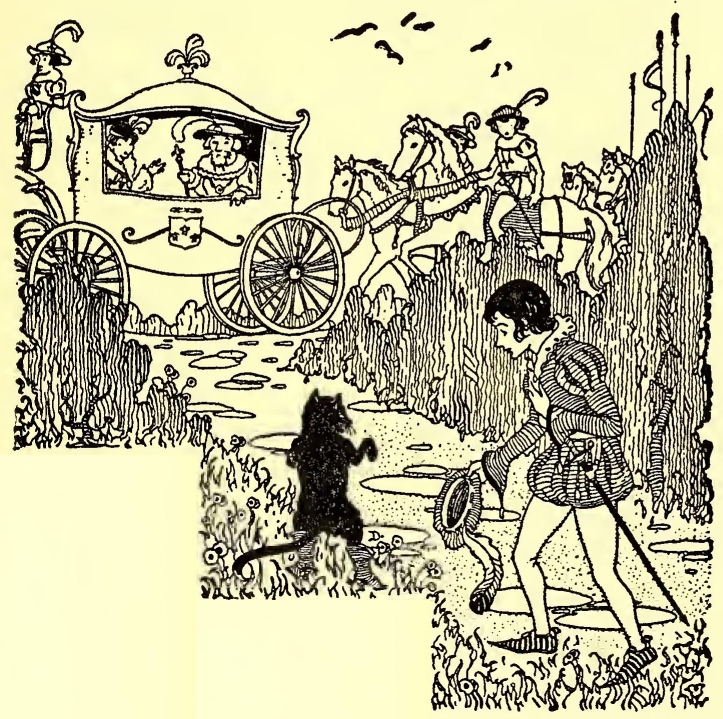
“My master was bathing, and some robbers came and stole his clothes. I ran after them and cried, ‘Stop, thief!’ but they got away. Then my master was carried beyond his depth, and would have drowned, if you had not come by with your men.”
At this the king bade one of his servants ride back and bring a fine suit of clothes for the Marquis, and they all waited. So, at last, the Marquis of Carabas came up to the carriage, dressed much more finely than he ever had been in his life. He was a handsome fellow, and he looked so well that the king at once bade him enter the carriage.
Puss now had things quite to his mind. He ran on before, and came to a meadow, where some men were mowing grass. He stopped before them, and said:—
“The king is coming this way. You must tell him that this field belongs to the Marquis of Carabas, or you shall all be chopped as fine as mince-meat.”
“When the carriage came by, the king put his head out, and said to the men:—
“This is good grass land. Who owns it?”
“The Marquis of Carabas,” they all said, for Puss had thrown them into a great fright.
“You have a fine estate, Marquis,” said the king.
“Yes, Sire,” he replied, tossing his head; “it pays me well.” Puss still ran before the carriage, and came soon to some reapers.
“Tell the king,” he cried, “that all this grain belongs to the Marquis of Carabas, or you shall all be chopped as fine as mince-meat.” The king now came by, and asked the reapers who owned the grain they were cutting.
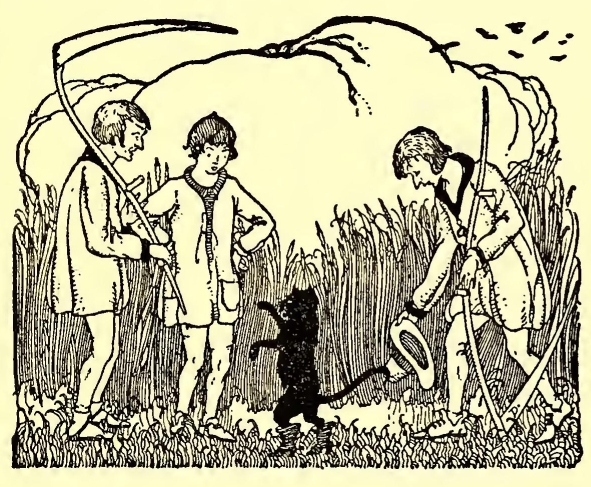
“The Marquis of Carabas,” they said. So it Went on. Puss bade the men in the fields call the Marquis of Carabas their lord, or it would go hard with them. The king was amazed. The Marquis took it all with a grand air. It was easy to see that he was a very rich and great man. The princess sat in the corner of the carriage, and thought the Marquis no mean fellow.
At last they drew near the castle of the one who really owned all the fields they had passed through. Puss asked about him, and found he was a monster who made every one about him very much afraid. Puss sent in word that he should like to pay his respects, and the monster bade him come in.
“I have been told,” said Puss, “that you can change yourself into any kind of animal. They say you can even make yourself a lion.”
“To be sure I can,” said the monster. “Do you not believe it? Look, and you shall see me become a lion at once.” When Puss saw a lion before him he was in a great fright, and got as far away as he could. There he stayed till the lion became a monster again.
“That was dreadful!” said Puss. “I was nearly dead with fear. But it must be much harder to make yourself small. They do say that you can turn into a mouse, but I do not believe it.”
“Not believe it!” cried the monster. “You shall see!” So he made himself at once into a mouse, and began running over the floor. In a twinkling Puss pounced upon him and gave him one shake. That was the end of the monster.
By this time the king had reached the gates of the castle, and thought he would like to see so fine a place. Puss heard the wheels, and ran down just as the king drove up to the door.
“Welcome!” he said, as he stood on the steps of the castle. “Welcome to the castle of the Marquis of Carabas!”
“What! my lord Marquis,” said the king, “does this castle, too, belong to you? I never saw anything so fine. I should really like to enter.”
“Your majesty is welcome!” said the young man, bowing low, taking off the cap which the king had given him. Then he gave his hand to the princess, and they went up the steps. Puss danced before them in his boots.
They came into a great hall, and there they found a feast spread. The monster had asked some friends to dine with him that day, but the news went about that the king was at the castle, and so they dared not go.
The king was amazed at all he saw, and the princess went behind him, just as much pleased. The Marquis of Carabas said little. He held his head high and played with his sword.
When dinner was over, the king took the Marquis one side, and said:—
“You have only to say the word, my lord Marquis, and you shall be the son-in-law of your king.”
So the Marquis married the princess, and Puss in Boots became a great lord, and hunted mice for mere sport, just when he pleased.
A farmer’s Sons once fell out. The Farmer tried to make peace between them, but he could not. Then he bade them bring him some sticks. These he tied together into a bundle, and gave the bundle to each of his Sons in turn, and told him to break it. Each Son tried, but could not.
Then he untied the bundle and gave them each one stick to break. This they did easily, and he said: “So is it with you, my Sons. If you are all of the same mind, your enemies can do you no harm. But if you quarrel, they will easily get the better of you.”
A Lion and a Bear chanced to fall upon a Fawn at the same time, and they began to fight for it. They fought so fiercely that at last they fell down, entirely worn out and almost dead.
A Fox, passing that way, saw them stretched out, and the Fawn dead between them. He stole in slyly, seized the Fawn, and ran away with it for his own dinner. When they saw this, they could not stir, but they cried out:—
“How foolish we were to take all this trouble for the Fox!”
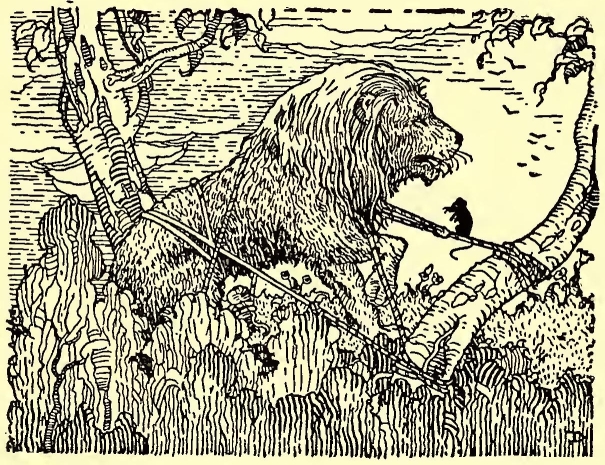
As a Lion lay asleep, a Mouse ran into his mouth. The Lion shut his teeth together and would have eaten him up, but the Mouse begged hard to be let out, saying:—
“If you will let me go, I will repay you some day.”
The Lion smiled, but let the Mouse out. Not long after, the Mouse had a chance to repay him. The Lion was caught by some hunters, and bound with ropes to a tree. The Mouse heard him roar and groan, and ran and gnawed the ropes, so that the Lion got free.
Then the Mouse said:—
“You laughed at me once, Lion, as if you could get nothing in return for your kindness to me. But now it is you who owe your life to me.”
There was once a Shoemaker who worked very hard and was honest. Still, he could not earn enough to live on. At last, all he had in the world was gone except just leather enough to make one pair of shoes. He cut these out at night, and meant to rise early the next morning to make them up.
His heart was light in spite of his troubles, for his conscience was clear. So he went quietly to bed, left all his cares to God, and fell asleep. In the morning he said his prayers and sat down to work, when, to his great wonder, there stood the shoes, already made, upon the table.
The good man knew not what to say or think. He looked at the work. There was not one false stitch in the whole job. All was neat and true.
That same day a customer came in, and the shoes pleased him so well that he readily paid a price higher than usual for them. The Shoemaker took the money and bought leather enough to make two pairs more. He cut out the work in the evening and went to bed early. He wished to be up with the sun and get to work.
He was saved all trouble, for when he got up in the morning, the work was done. Pretty soon buyers came in, who paid him well for his goods. So he bought leather enough for four pairs more.
He cut out the work again over night, and found it finished in the morning as before. So it went on for some time. What was got ready at night was always done by daybreak, and the good man soon was well to do.
One evening, at Christmas time, he and his wife sat over the fire, chatting, and he said:—
“I should like to sit up and watch to-night, that we may see who it is that comes and does my work for me.” So they left the light burning, and hid themselves behind a curtain to see what would happen.
As soon as it was midnight, there came two little Elves. They sat upon the Shoemaker’s bench, took up all the work that was cut out, and began to ply their little fingers. They stitched and rapped and tapped at such a rate that the Shoemaker was amazed, and could not take his eyes off them for a moment.
On they went till the job was done, and the shoes stood, ready for use, upon the table. This was long before daybreak. Then they ran away as quick as lightning. The next day the wife said to the Shoemaker:—
“These little Elves have made us rich, and we ought to be thankful to them and do them some good in return. I am vexed to see them run about as they do. They have nothing upon their backs to keep off the cold. I’ll tell you what we must do; I will make each of them a shirt, and a coat and waistcoat, and a pair of pantaloons into the bargain. Do you make each of them a little pair of shoes.”
The good Shoemaker liked the thought very well. One evening, he and his wife had the clothes ready, and laid them on the table instead of the work they used to cut out. Then they went and hid behind the curtain to watch what the little Elves would do.
At midnight the Elves came in and were going to sit down at their work as usual. But when they saw the clothes lying there for them, they laughed and were in high glee.
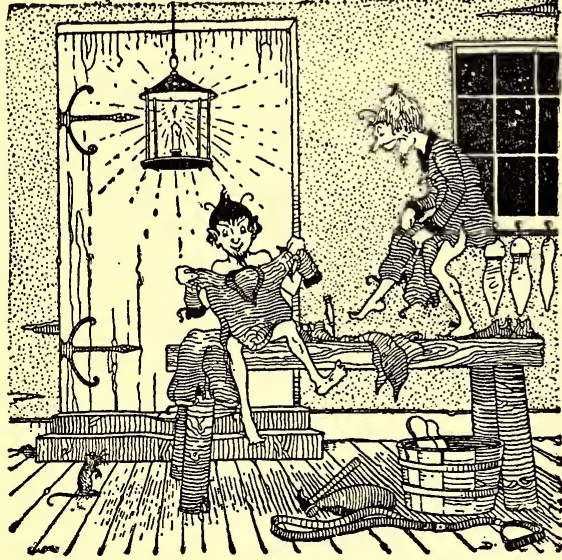
They dressed themselves in the twinkling of an eye, and danced and capered and sprang about as merry as could be, till at last they danced out of the door, and over the green.
The Shoemaker saw them no more, but everything went well with him as long as he lived.

A thirsty Stag came to a spring to drink. As he drank, he looked into the water and saw himself. He was very proud of his horns, when he saw how big they were and what branches they had. But he looked at his feet, and took it hard that they should be so thin and weak.
Now, while he was thinking about these things, a Lion sprang out and began to chase him. The Stag turned and ran. As he was very fleet, he outran the Lion so long as they were on the open plain. But when they came to a piece of woods, the Stag’s horns became caught in the branches of the trees. He could not run, and the Lion caught up with him.
As the Lion fell upon him with his claws, the Stag cried oat:—
“What a wretch am I! I was made safe by the very parts I scorned, and have come to my end by the parts I gloried in!”
A certain wise man was wont to go out every evening and gaze at the stars. Once his walk took him outside of the town, and as he was looking earnestly into the sky, he fell into a ditch.
He was in a sad plight, and set up a cry. A man who was passing by heard him, and stopped to see what was the matter.
“Ah, sir,” said he, “when you are trying to make out what is in the sky, you do not see what is on the earth.”
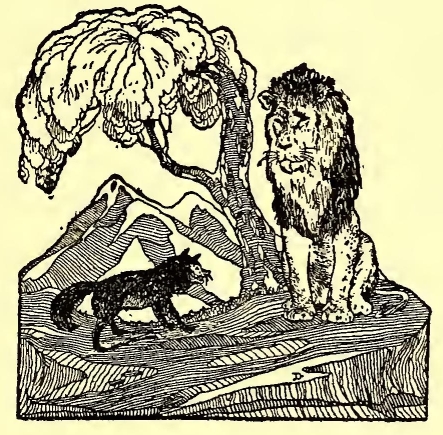
A Fox who had never seen a Lion happened one day to meet one. When he saw him, he was so afraid that he almost died. When he met him a second time, he was afraid, to be sure, but not as at first. The third time he saw him, the Fox was so bold that he went up to the Lion and spoke to him.
This fable teaches that, when we get used to fearful things, they do not frighten us so much as at first.
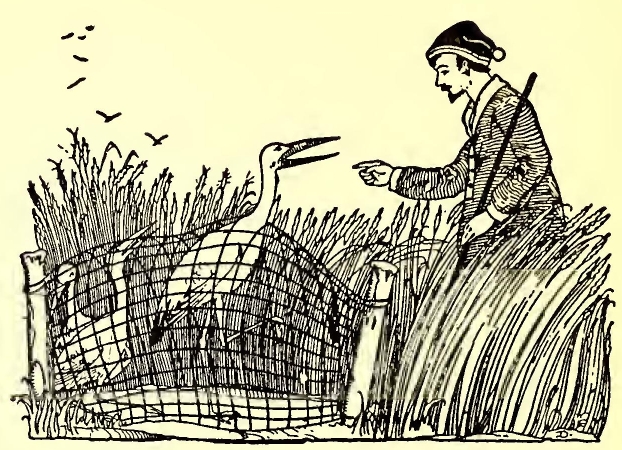
A Farmer set a net in his field to catch the Cranes that were eating his grain. He caught the Cranes, and with them a Stork also. The Stork was lame, and begged the Farmer to let him go.
“I am not a Crane,” he said. “I am a Stork. I am a very good bird, and take care of my father and mother. Look at the color of my skin; it is not the same as the Crane’s.”
But the Farmer said: “I do not know how that is. I caught you with the Cranes, and with the Cranes you must die.”
It is well to keep out of the way of wicked people, lest we fall into the trap with them.
A Dog was lying asleep in front of a stable. A Wolf suddenly came upon him, and was about to eat him, but the Dog begged for his life, saying:—
“I am lean and tough now; but wait a little, for my master is going to give a feast, and then I shall have plenty to eat; I shall grow fat, and make a better meal for you.”
So the Wolf agreed, and went away. By and by he came back, and found the Dog asleep on the house-top. He called to him to come down now and do as he had agreed. But the Dog answered:—
“Good Wolf, if you ever catch me again asleep in front of the stable, you had better not wait for the feast to come off.”
This fable teaches that wise men, when they escape danger, take care afterwards not to run the same risk.
An unlucky Fox fell into a well, and cried out for help. A Wolf heard him, and looked down to see what the matter was.
“Ah!” said the Fox, “pray lend a hand, friend, and get me out of this.”
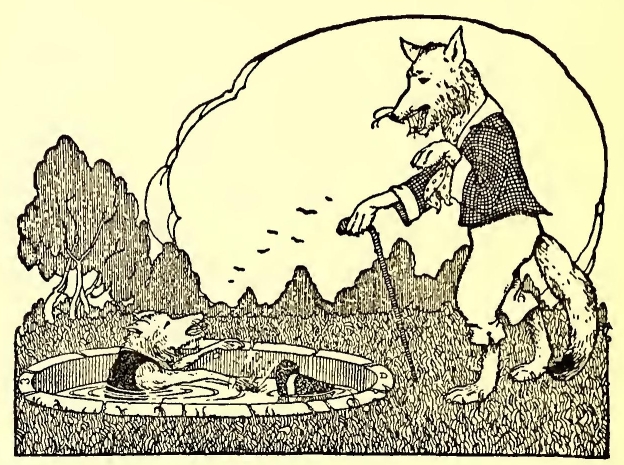
“Poor creature,” said the Wolf, “how did this come about? How long have you been here? You must be very cold.”
“Come, come,” says the Fox, “this is no time for pitying and asking questions; get me out of the well first, and I will tell you all about it afterwards.”
Every man carries two Packs, one in front, the other behind, and each is full of faults. But the one in front holds other people’s faults, the one behind holds his own. And so it is that men do not see their own faults at all, but see very clearly the faults of others.
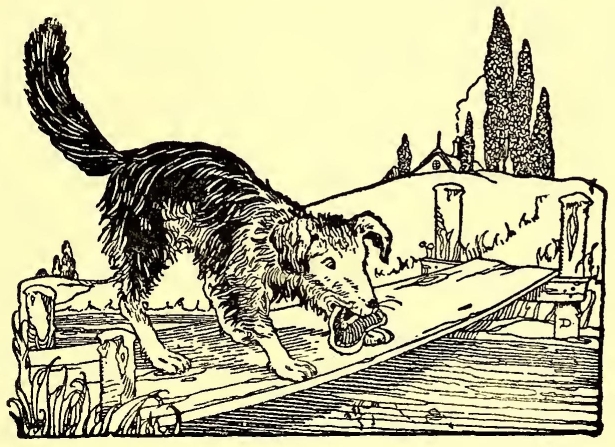
A Dog, with a bit of meat in his mouth, was crossing a river. Looking down he saw his image in the water, and thought it was another dog, with a bigger piece. So he dropped what he had, and jumped into the water after the other piece. Thus he lost both pieces: the one he really had, which he dropped; and the other he wanted, which was no piece at all.
This is a good fable for greedy people.
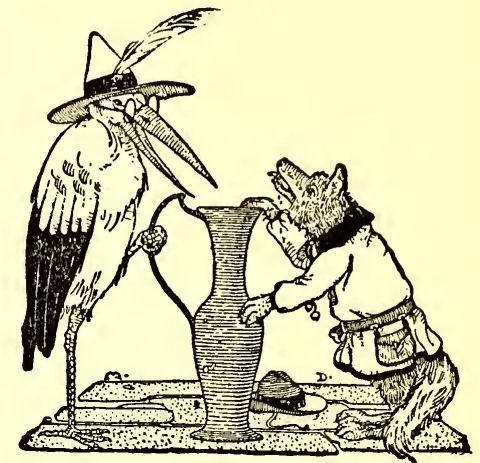
The Fox invited the Stork to sup with him, and placed a shallow dish on the table. The Stork, with her long bill, could get nothing out of the dish, while the Fox could lap up the food with his tongue; and so the Fox laughed at the Stork.
The Stork, in her turn, asked the Fox to dine with her. She placed the food in a long-necked jar, from which she could easily feed with her bill, while the Fox could get nothing. That was tit for tat.
A wild young fellow, who had spent all his father’s money, and had only a cloak left upon his back, when he saw a Swallow flying about before it was time said: “Ah, summer has come! I shall not need my cloak any longer; so I will sell it.” But afterwards a storm came, and, when it was past, he saw the poor Swallow dead on the ground. “Ah, my friend!” said he, “you are lost yourself, and you have ruined me.”
One Swallow does not make a summer.
In the days of King Alfred a poor woman lived in a country village in England. She had an only son, Jack, who was a good-natured, idle boy. She was too easy with him. She never set him at work, and soon there was nothing left them but their cow. Then the mother began to weep and to think that she had brought up her boy very ill.
“Cruel boy!” she said. “You have at last made me a beggar. I have not money enough to buy a bit of bread. We cannot starve. We must sell the cow, and then what shall we do?”
At first Jack felt very badly and wished he had done better. But soon he began to think what fun it would be to sell the cow. He begged his mother to let him go with the cow to the nearest village. She was not very willing. She did not believe Jack knew enough to sell a cow, but at last she gave him leave.
Off went Jack with the cow. He had not gone far when he met a Butcher.
“Where are you going with your cow?” asked the Butcher.
“I am going to sell it,” said Jack. The Butcher held his hat in his hand and shook it. Jack looked into the hat and saw some odd-looking beans. The Butcher saw him eye them. He knew how silly Jack was, so he said to him:—
“Well, if you wish to sell your cow, sell her to me. I will give you all these beans for her.”
Jack thought this a fine bargain. He gave the Butcher the cow and took the beans. He ran all the way home and could hardly wait to reach the house. He called out to his mother to see what he had got for the cow.
When the poor woman saw only a few beans, she burst into tears. She was so vexed that she threw the beans out of the window. She did not even cook them for supper. They had nothing else to eat, and they went to bed hungry.
Jack awoke early the next morning and thought it very dark. He went to the window and could hardly see out of it, for it was covered with something green. He ran downstairs and into the garden. There he saw a strange sight.
The beans had taken root and shot up toward the clouds. The stalks were as thick as trees, and were wound about each other. It was like a green ladder, and Jack at once wished to climb to the top.
He ran in to tell his mother, but she begged him not to climb the bean-stalk. She did not know what would happen. She was afraid to have him go. Who ever saw such bean-stalks before?
But Jack had set his heart on climbing, and he told his mother not to be afraid. He would soon see what it all meant. So up he climbed. He climbed for hours. He went higher and higher, and at last, quite tired out, he reached the top.
Then he looked about him. It was all new. He had never seen such a place before. There was not a tree or plant; there was no house or shed. Some stones lay here and there, and there were little piles of earth. He could not see a living person.
Jack sat down on one of the stones. He wished he were at home again. He thought of his mother. He was hungry, and he did not know where to get anything to eat. He walked and walked, and hoped he might see a house.
He saw no house, but at last he saw a lady walking alone. He ran toward her, and when he came near, he pulled off his cap and made a bow. She was a beautiful lady, and she carried in her hand a stick. A peacock of fine gold sat on top of the stick.
The lady smiled and asked Jack how he came there. He told her all about the bean-stalk. Then she said:—
“Do you remember your father?”
“No,” said Jack. “I do not know what became of him. When I speak of him to my mother, she cries, but she tells me nothing.”
“She dare not,” said the lady, “but I will tell you. I am a fairy. I was set to take care of your father, but one day I was careless. So I lost my power for a few years, and just when your father needed me most I could not help him, and he died.”
Jack saw that she was very sorry as she told this story, but he begged her to go on.
“I will,” she said, “and you may now help your mother. But you must do just as I tell you.”
Jack promised.
“Your father was a good, kind man. He had a good wife, he had money, and he had friends. But he had one false friend. This was a Giant. Your father had once helped this Giant, but the Giant was cruel. He killed your father and took all his money. And he told your mother she must never tell you about your father. If she did, then the Giant would kill her and kill you too.
“You were a little child then, and your mother carried you away in her arms. I could not help her at the time, but my power came back to me yesterday. So I made you go off with the cow, and I made you take the beans, and I made you climb the bean-stalk.
“This is the land where the Giant lives. You must find him and rid the world of him. All that he has is yours, for he took it from your father. Now go. You must keep on this road till you see a great house. The Giant lives there. I cannot tell you what you must do next, but I will help you when the time comes. But you must not tell your mother anything.”
The fairy disappeared and Jack set out. He walked all day, and when the sun set, he came to the Giant’s house. He went up to it and saw a plain woman by the door. This was the Giant’s wife. Jack spoke to her and asked her if she would give him something to eat and a place where he could sleep.
“What!” she said. “Do you not know? My husband is a Giant. He is away now, but he will be back soon. Sometimes he walks fifty miles in a day to see if he can find a man or a boy. He eats people. He will eat you if he finds you here.”
Jack was in great fear, but he would not give up. He asked the Giant’s wife to hide him somewhere in the house. She was a kind woman, so she led him in. They went through a great hall, and then through some large rooms. They came to a dark passage, and went through it. There was a little light, and Jack could see bars of iron at the side. Behind the bars were wretched people. They were the prisoners of the Giant.
Poor Jack thought of his mother and wished himself at home again. He began to think the Giant’s wife was as bad as the Giant, and had brought him in to shut him up here. Then he thought of his father and marched boldly on.
They came to a room where a table was set. Jack sat down and began to eat. He was very hungry and soon forgot his fears. But while he was eating, there came a loud knock at the outside door. It was so loud that the whole house shook. The Giant’s wife turned pale.
“What shall I do?” she cried. “It is the Giant. He will kill you and kill me too! What shall I do?”
“Hide me in the oven,” said Jack. There was no fire under it, and Jack lay in the oven and looked out. The Giant came in and scolded his wife, and then he sat down and ate and drank for a long time. Jack thought he never would finish. At last the Giant leaned back in his chair and called out in a loud voice:—
“Bring me my hen!”
His wife brought a beautiful hen and placed it on the table.
“Lay!” roared the Giant, and the hen laid an egg of solid gold.
“Lay another!” And the hen laid another. So it went on. Each time the hen laid a larger egg than before. The Giant played with the hen for some time. Then he sent his wife to bed, but he sat in his chair. Soon he fell asleep, and then Jack crept out of the oven and seized the hen. He ran out of the house and down the road. He kept on till he came to the bean-stalk, and climbed down to his old home.
Jack’s mother was very glad to see him. She was afraid that he had come to some ill end. “Not a bit of it, mother,” said he. “Look here!” and he showed her the hen. “Lay!” he said to the hen, and the hen laid an egg of gold.
Jack and his mother now had all they needed, for they had only to tell the hen to lay, and she laid her golden egg. They sold the egg and had money enough. But Jack kept thinking of his father, and he longed to make another trial. He had told his mother about the Giant and his wife, but he had said nothing about the fairy and his father.
His mother begged Jack not to climb the beanstalk again. She said the Giant’s wife would be sure to know him, and he never would come back alive. Jack said nothing, but he put on some other clothes and stained his face and hands another color. Then, one morning, he rose early and climbed the bean-stalk a second time.
He went straight to the Giant’s house. The Giant’s wife was again at the door, but she did not know him. He begged for food and a place to sleep. She told him about the Giant, and then she said:—
“There was once a boy who came just as you have come. I let him in, and he stole the Giant’s hen and ran away. Ever since the Giant has been very cruel to me. No, I cannot let you come in.”
But Jack begged so hard that at last she let him in. She led him through the house, and he saw just what he had seen before. She gave him something to eat, and then she hid him in a closet. The Giant came along in his heavy boots. He was so big, that the house shook. He sat by the fire for a time. Then he looked about and said:—
“Wife, I smell fresh meat.”
“Yes,” she said. “The crows have been flying about. They left some raw meat on top of the house.”
Then she made haste and got some supper for the giant.
He was very cross. So it went on as before. The Giant ate and drank. Then he called to his wife:—
“Bring me something. I want to be amused. You let that rascal steal my hen. Bring me something.”
“What shall I bring?” she asked meekly.
“Bring me my money-bags; they are as heavy as anything.” So she tugged two great bags to the table. One was full of silver and one was full of gold. The Giant sent his wife to bed. Then he untied the strings, emptied his bags, and counted his money. Jack watched him, and said to himself:—
“That is my father’s money.”
By and by the Giant was tired. He put the money back into the bags and tied the strings. Then he went to sleep. He had a dog to watch his money, but Jack did not see the dog. So when the Giant was sound asleep, Jack came out of the closet and laid hold of the bags.
At this the dog barked, and Jack thought his end had come. But the Giant did not wake, and Jack just then saw a bit of meat. He gave it to the dog, and while the dog was eating it, Jack took the two bags and was off.
It was two whole days before he could reach the bean-stalk, for the bags were very heavy. Then he climbed down with them. But when he came to his house the door was locked. No one was inside, and he knew not what to do.
After a while he found an old woman who showed him where his mother was. She was very sick in another house. The poor thing had been made ill by Jack’s going away. Now that he had come back, she began to get well, and soon she was in her own house again.
Jack said no more about the Giant and the bean-stalk. For three years he lived with his mother. They had money enough, and all seemed well. But Jack could not forget his father. He sat all day before the bean-stalk. His mother tried hard to amuse him, and she tried to find out what he was thinking about. He did not tell her, for he knew all would then go wrong.
At last he could bear it no longer. He had changed in looks now, and he changed himself still more. Then, one bright summer morning, very early in the day, he climbed the bean-stalk once more. The Giant’s wife did not know him when he came to the door of the house. He had hard work to make her let him in.
This time he was hidden in the copper boiler.
The Giant again came home, and was in a great rage.
“I smell fresh meat!” he cried. His wife could do nothing with him, and he began to go about the room. He looked into the oven, and into the closet, and then he came to the great boiler. Jack felt his heart stop. He thought now his end had come, surely. But the Giant did not lift the lid. He sat down by the fire and had his supper.
When supper was over, the Giant told his wife to bring his harp. Jack peeped out of the copper and saw a most beautiful harp. The Giant placed it on the table, and said:—
“Play!”
Jack never heard such music as the harp played. No hands touched it. It played all by itself. He thought he would rather have this harp than the hen or all the money. By and by the harp played the Giant to sleep. Then Jack crept out and seized the harp. He was running off with it, when some one called loudly:—
“Master! Master!”
It was the harp, but Jack would not let it go. The Giant started up, and saw Jack with the harp running down the road.
“Stop, you rascal!” he shouted. “You stole my hen and my money-bags. Do you steal my harp? I’ll catch you, and I’ll break every bone in your body!”
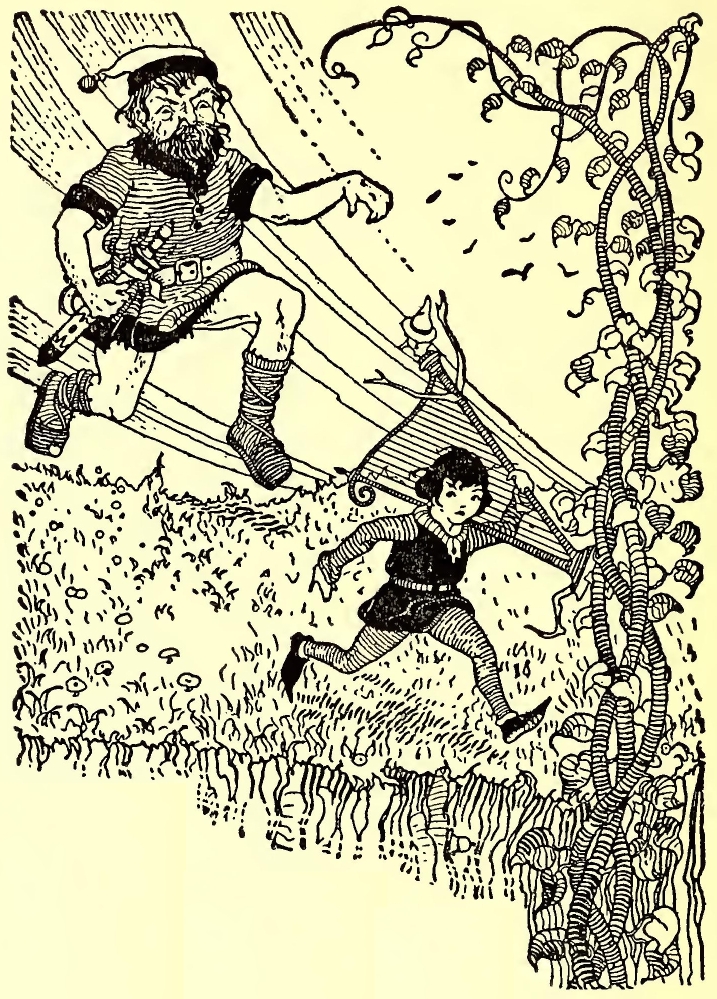
“Catch me if you can!” said Jack. He knew he could run faster than the Giant. Off they went, Jack and the harp, and the Giant after them. Jack came to the bean-stalk. The harp was all the while playing music, but now Jack said:—
“Stop!” and the harp stopped playing. He hurried down the bean-stalk with the harp. There sat his mother, by the cottage, weeping.
“Do not cry, mother,” he said. “Quick, bring me a hatchet! Make haste!” He knew there was not a minute to spare. The Giant was already coming down. He was half-way down when Jack took his hatchet and cut the beanstalk down, close to its roots. Over fell the bean-stalk, and down came the Giant upon the ground. He was killed on the spot.
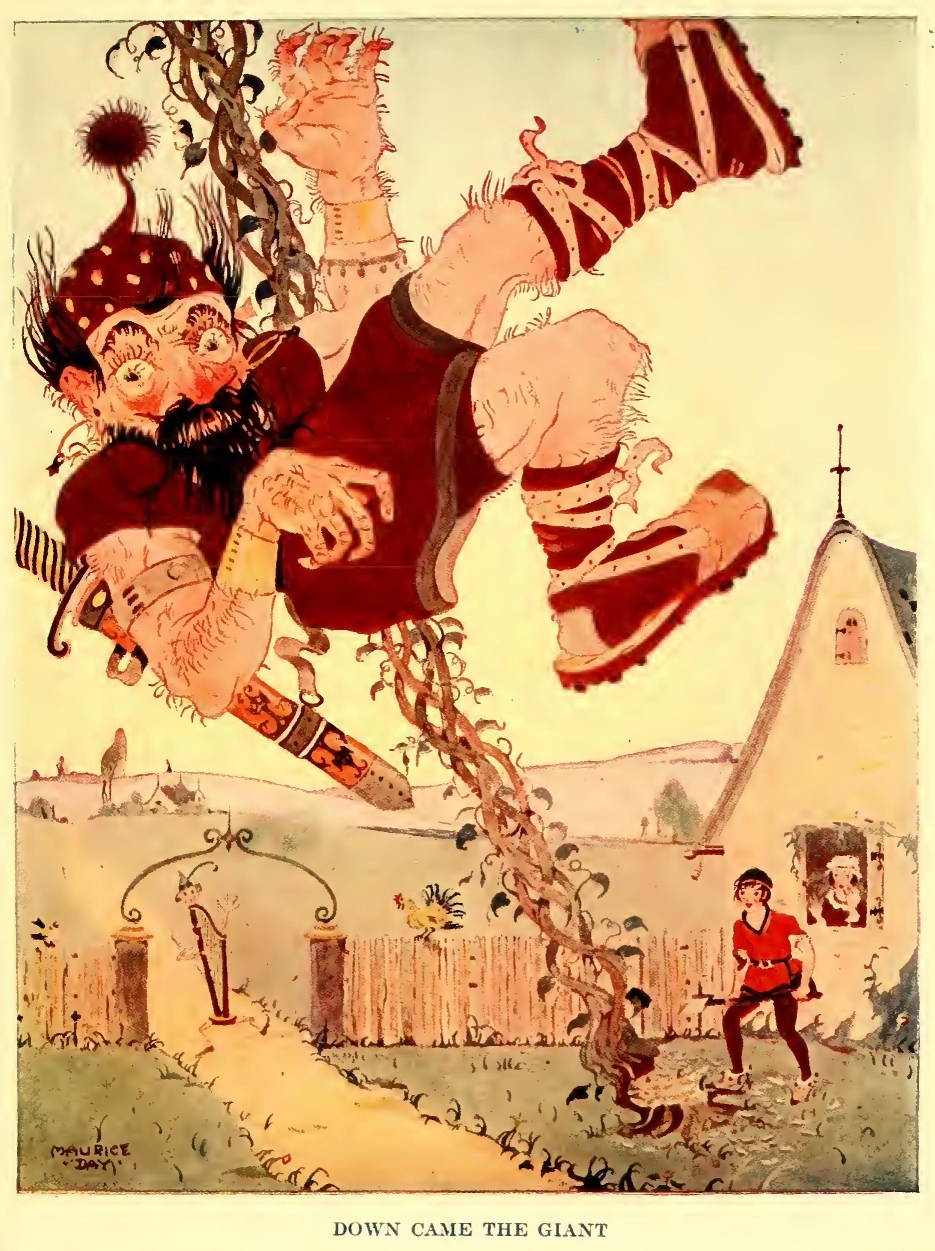
In a moment the fairy was seen. She told Jack’s mother everything, and how brave he had been. And that was the end. The beanstalk never grew again.
An Ox, grazing in a swampy meadow, set his foot among a number of young Frogs, and crushed nearly all to death. One that escaped ran off to his mother with the dreadful news.
“Oh, mother,” said he, “it was a beast—such A big, four-footed beast, that did it!”
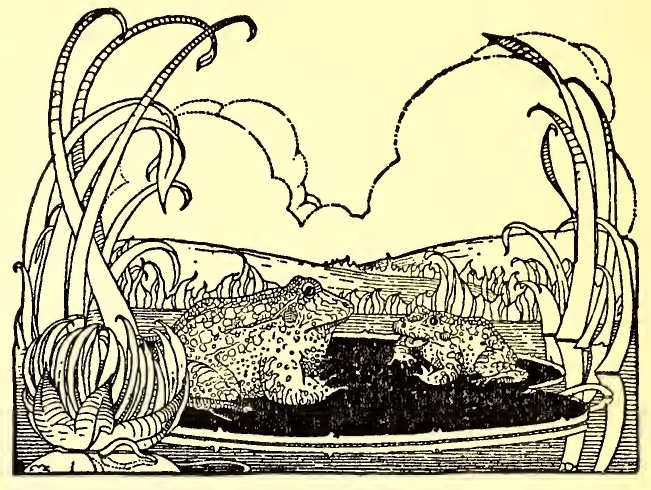
“Big?” said the old Frog. “How big? Was it as big as this?” and she puffed herself out. “Oh, a great deal bigger than that.”
“Well, was it so big?” and she swelled herself out more.
“Indeed, mother, it was; and if you were to burst yourself, you would never reach half its size.” The old Frog made one more trial, determined to be as big as the Ox, and burst herself indeed.
A Miller and his Son were driving their Ass to the fair to sell him. They had not gone far, when they met a troop of girls, returning from the town, talking and laughing.
“Look there!” cried one of them. “Did you ever see such fools, to be trudging along on foot, when they might be riding?” The Miller, when he heard this, bade his Son get up on the Ass, and walked along merrily by his side. Soon they came to a group of old men talking gravely.
“There!” said one of them; “that proves what I was saying. What respect is shown to old age in these days? Do you see that idle young rogue riding, while his father has to walk? Get down, lazy boy, and let the old man get on!”
The Son got down from the Ass, and the Miller took his place. They had not gone far when they met a company of women and children.
“Why, you lazy old fellow!” cried several at once. “How can you ride upon the beast, when that poor little lad can hardly keep up with you?”
So the good-natured Miller took his Son up behind him. They had now almost reached the town.
“Pray, my friend,” said a townsman, “is that Ass your own?”
“Yes,” said the Miller.
“I should not have thought so,” said the other, “by the way you load him. Why, you two are better able to carry the poor beast than he to carry you.”
“Anything to please you,” said the Miller. So he and his Son got down from the Ass. They tied his legs together, and, taking a stout pole, tried to carry him on their shoulders over a bridge that led to the town.
This was so odd a sight that crowds of people ran out to see it, and to laugh at it. The Ass, not liking to be tied, kicked the cords away, and tumbled off the pole into the water. At this the Miller and his Son hung down their heads. They made their way home again, having learned that by trying to please everybody, they had pleased nobody, and lost the Ass into the bargain.
Once upon a time there lived a man and his wife and one beautiful daughter. The wife fell sick and died, and some time after the father married again, for he needed some one to take care of his child. The new wife appeared very well before the wedding, but afterward she showed a bad temper. She had two children of her own, and they were proud and unkind like their mother. They could not bear their gentle sister, and they made her do all the hard work.
She washed the dishes, and scrubbed the stairs. She swept the floor in my lady’s chamber, and took care of the rooms of the two pert misses. They slept on soft beds in fine rooms, and had tall looking-glasses, so that they could admire themselves from top to toe. She lay on an old straw sack in the garret.
She bore all this without complaint. She did her work, and then sat in the corner among the ashes and cinders. So her two sisters gave her the name of Cinderella or the cinder-maid. But Cinderella was really much more beautiful than they; and she surely was more sweet and gentle.
Now the king’s son gave a ball, and he invited all the rich and the grand. Cinderella’s two sisters were fine ladies; they were to go to the ball. Perhaps they would even dance with the prince. So they had new gowns made, and they looked over all their finery.
Here was fresh work for poor Cinderella. She must starch their ruffles and iron their linen. All day long they talked of nothing but their fine clothes.
“I shall wear my red velvet dress,” said the elder, “and trim it with my point lace.”
“And I,” said the younger sister, “shall wear a silk gown, but I shall wear over it a gold brocade, and I shall put on my diamonds. You have nothing so fine.”
Then they began to quarrel over their clothes, and Cinderella tried to make peace between them. She helped them about their dresses, and offered to arrange their hair on the night of the ball.
While she was thus busy, the sisters said to her:—
“And pray, Cinderella, would you like to go to the ball?”
“Nay,” said the poor girl; “you are mocking me. It is not for such as I to go to balls.”
“True enough,” they said. “Folks would laugh to see a cinder-maid at a court ball.”
Any one else would have dressed their hair ill to spite them for their rudeness. But Cinderella was good-natured, and only took more pains to make them look well.
The two sisters scarcely ate a morsel for two days before the ball. They wished to look thin and graceful. They lost their tempers over and over, and they spent most of the time before their tall glasses. There they turned and turned to see how they looked behind, and how their long trains hung.
At last the evening came, and off they set in a coach. Cinderella watched them till they were out of sight, and then she sat down by the kitchen fire and began to weep.
All at once her fairy godmother appeared, with her wand.
“What are you crying for, my little maid?”
“I wish—I wish,” began the poor girl, but her voice was choked with tears.
“You wish that you could go to the ball?”
Cinderella nodded.
“Well, then, if you will be a good girl, you shall go. Run quick and fetch me a pumpkin from the garden.”
Cinderella flew to the garden and brought back the finest pumpkin she could find. She could not guess what use it would be, but the fairy scooped it hollow, and then touched it with her wand. The pumpkin became at once a splendid gilt coach.
“Now fetch me the mouse-trap from the pantry.”
In the mouse-trap were six sleek mice. The fairy opened the door, and as they ran out she touched each with her wand, and it became a gray horse. But what was she to do for a coachman?
“We might look for a rat in the rat-trap,” said Cinderella.
“That is a good thought. Run and bring the rat-trap, my dear.”
Back came Cinderella with the trap. In it were three large rats. The fairy chose one that had long black whiskers, and she made him the coachman.
“Now go into the garden and bring me six lizards. You will find them behind the water-pot.”
These were no sooner brought than, lo! with a touch of the wand they were turned into six footmen, who jumped up behind the coach, as if they had done nothing else all their days. Then the fairy said:—
“Here is your coach and six, Cinderella; your coachman and your footmen. Now you can go to the ball.”
“What! in these clothes?” and Cinderella looked down at her ragged frock. The fairy laughed, and just touched her with the wand. In a twinkling, her shabby clothes were changed to a dress of gold and silver lace, and on her bare feet were silk stockings and a pair of glass slippers, the prettiest ever seen.
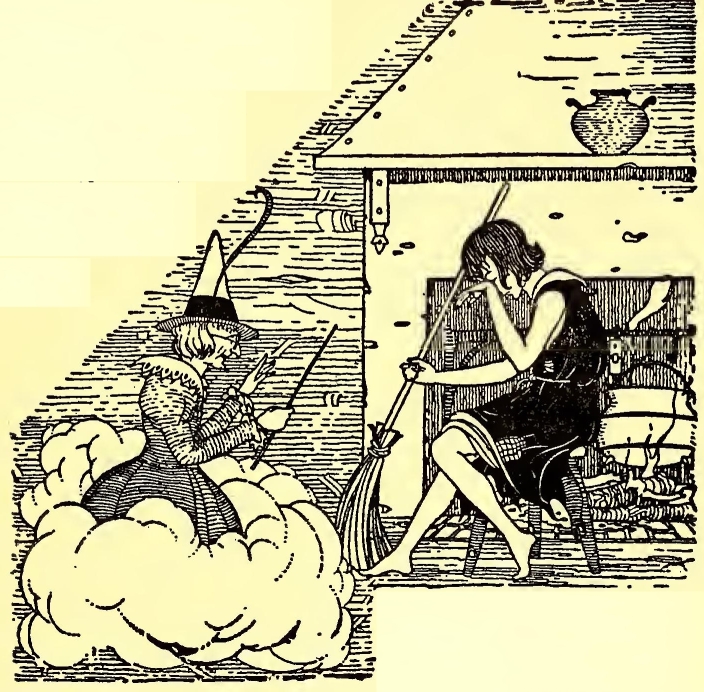
“Now go to the ball, Cinderella; but remember, if you stay one moment after midnight, your coach will instantly become a pumpkin, your horses will be mice, your coachman a rat, and your footmen lizards. And you? You will be once more only a cinder-maid in a ragged frock and with bare feet.”
Cinderella promised and drove away in high glee. She dashed up to the palace, and her coach was so fine that the king’s son came down the steps of the palace to hand out this unknown princess. He led her to the hall where all the guests were dancing.
The moment she appeared all voices were hushed, the music stopped, and the dancers stood still. Such a beautiful princess had never been seen! Even the king, old as he was, turned to the queen and said:—
“She is the most beautiful being I ever saw—since I first saw you!”
As for the ladies of the court, they were all busy looking at Cinderella’s clothes. They meant to get some just like them the very next day, if possible.
The prince led Cinderella to the place of highest rank, and asked her hand for the next dance. She danced with so much grace that he admired her more and more. Supper was brought in, but the prince could not keep his eyes off the beautiful stranger. Cinderella went and sat by her sisters, and shared with them the fruit which the prince gave her. They were very proud to have her by them, for they never dreamed who she really was.
Cinderella was talking with them, when she heard the clock strike the quarter hour before twelve. She went at once to the king and queen, and made them a low courtesy and bade them good-night. The queen said there was to be another ball the next night, and she must come to that. The prince led her down the steps to her coach, and she drove home.
At the house the fairy sat waiting for Cinderella. The maiden began to tell all that had happened, and was in the midst of her story, when a knock was heard at the door. It was the sisters coming home from the ball. The fairy disappeared, and Cinderella went to the door, rubbing her eyes, as if she had just waked from a nap. She was once more a poor little cinder-maid.
“How late you are!” she said, as she opened the door.
“If you had been to the ball, you would not have thought it late,” said her sisters. “There came the most beautiful princess that ever was seen. She was very polite to us, and loaded us with oranges and grapes.”
“Who was she?” asked Cinderella.
“Nobody knew her name. The prince would give his eyes to know.”
“Ah! how I should like to see her,” said Cinderella. “Oh, do, my Lady Javotte,”—that was the name of the elder sister,—“lend me the yellow dress you wear every day, and let me go to the ball and have a peep at the beautiful princess.”
“What! lend my yellow gown to a cinder-maid! I am not so silly as that.”
Cinderella was not sorry to have Javotte say no; she would have been puzzled to know what to do if her sister had really lent her the dress she begged for.
The next night came, and the sisters again went to the court ball. After they had gone, the fairy came as before and made Cinderella ready.
“Now remember,” she said, as the coach drove away, “remember twelve o’clock.”
Cinderella was even more splendid than on the first night, and the king’s son never left her side He said so many pretty things that Cinderella could think of nothing else. She forgot the fairy’s warning; she forgot her promise. Eleven o’clock came, but she did not notice the striking. The half-hour struck, but the prince grew more charming, and Cinderella could hear nothing but his voice. The last quarter—but still Cinderella sat by the prince.
Then the great clock on the tower struck the first stroke of twelve. Up sprang Cinderella, and fled from the room. The prince started to follow her, but she was too swift for him; in her flight, one of her glass slippers fell from her feet, and he stopped to pick it up.
The last stroke of twelve died away, as Cinderella darted down the steps of the palace. In a twinkling the gay lady was gone; only a shabby cinder-maid was running down the steps. The splendid coach and six, driver and footman,—all were gone; only a pumpkin lay on the ground, and a rat, six mice, and six lizards scampered off.
Cinderella reached home, quite out of breath. She had saved nothing of all her finery but one little glass slipper. The prince had its mate, but he had lost the princess. He asked the soldiers at the palace gate if they had not seen her drive away. No; at that hour only a ragged girl had passed out.
Soon the two sisters came home from the ball, and Cinderella asked them if they had again seen the beautiful lady. Yes; she had been at the ball, but she had left suddenly, and no one knew what had become of her. But the prince would surely find her, for he had one of her glass slippers.
They spoke truly. A few days afterward, the king’s son sent a messenger with a trumpet and the slipper through all the city. The messenger sounded his trumpet and shouted that the prince would marry the lady who could wear the glass slipper. So the slipper was first tried on by all the princesses; then by all the duchesses; next by all the persons belonging to the court; but in vain: not one could wear it.
Then it was carried to all the fine houses, and it came at last to the two sisters. They tried with all their might to force a foot into the fairy slipper, but they could not. Cinderella stood by, and said:—
“Suppose I were to try.” Her two sisters jeered at her, but the messenger looked at Cinderella. He saw that she was very fair, and, besides, he had orders to try the slipper on the foot of every maiden in the kingdom, if need were.
So he bade Cinderella sit down on a three-legged stool in the kitchen. She put out her little foot, and the slipper fitted like wax. The sisters stood in amaze. Then Cinderella put her hand into her pocket and drew forth the other glass slipper, and put it on her other foot.
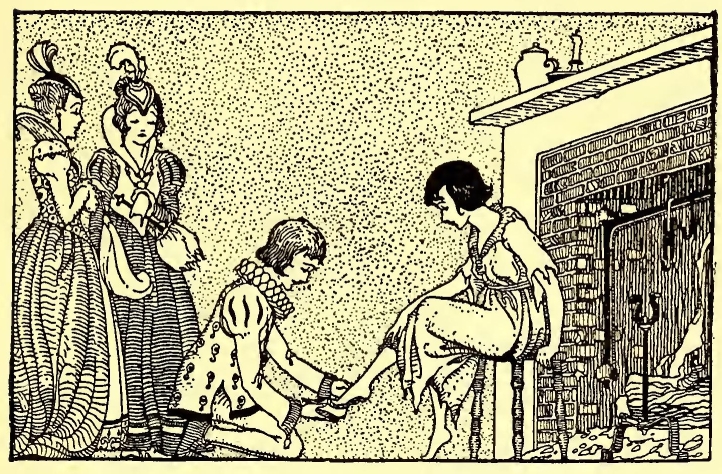
The moment that Cinderella did this, the fairy, who stood by unseen, touched her with her wand, and the cinder-maid again became the beautiful, gayly dressed lady. The sisters saw that she was the same one whom they had seen at the ball. They thought how ill they had treated her all these years, and they fell at her feet and asked her to forgive them.
Cinderella was as good now as she had been when she was a cinder-maid. She freely forgave her sisters, and took them to the palace with her, for she was now to be the prince’s wife. And when the old king and queen died, the prince and Cinderella became King and Queen.
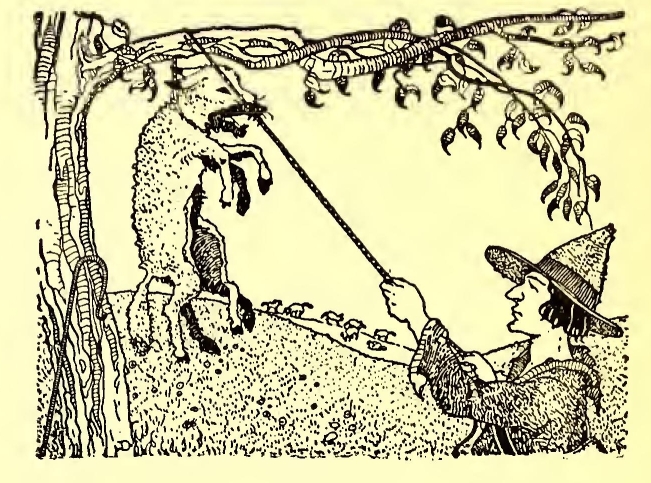
A Wolf once dressed himself in the skin of a Sheep, and so got in among the flock, where he killed a good many of them. At last the Shepherd found him out, and hanged him upon a tree as a warning to other wolves.
Some Shepherds going by saw the wolf, and thought it was a Sheep. They wondered why the Shepherd should hang a Sheep. So they asked him, and he answered: “I hang a Wolf when I catch him, even though he be dressed in a Sheep’s clothes.”
One cold night, as an Arab sat in his tent, a Camel thrust the flap of the tent aside, and looked in.
“I pray thee, master,” he said, “let me put my head within the tent, for it is cold without.”
“By all means, and welcome,” said the Arab; and the Camel stretched his head into the tent.
“If I might but warm my neck, also,” he said, presently.
“Put your neck inside,” said the Arab. Soon the Camel, who had been turning his head from side to side, said again:—
“It will take but little more room if I put my fore legs within the tent. It is difficult standing without.”
“You may also put your fore legs within,” said the Arab, moving a little to make room, for the tent was very small.
“May I not stand wholly within?” asked the Camel, finally. “I keep the tent open by standing as I do.”
“Yes, yes,” said the Arab. “I will have pity on you as well as on myself. Come wholly inside.”
So the Camel came forward and crowded into the tent. But the tent was too small for both.
“I think,” said the Camel, “that there is not room for both of us here. It will be best for you to stand outside, as you are the smaller; there will then be room enough for me.”
And with that he pushed the Arab a little, who made haste to get outside of the tent.
It is a wise rule to resist the beginnings of evil.
A poor woodman once sat by the fire in his cottage, and his wife sat by his side, spinning.
“How lonely it is,” said he, “for you and me to sit here by ourselves without any children to play about and amuse us.”
“What you say is very true,” said his wife, as she turned her wheel. “How happy should I be, if I had but one child. If it were ever so small, if it were no bigger than my thumb, I should be very happy and love it dearly.”
Now it came to pass that the good woman had her wish, for some time afterward she had a little boy who was healthy and strong, but not much bigger than her thumb. So they said:—
“Well, we cannot say we have not got what we wished for, and, little as he is, we will love him dearly!” and they called him Tom Thumb. They gave him plenty to eat, yet he never grew bigger. Still his eyes were sharp and sparkling, and he soon showed himself to be a bright little fellow, who always knew what he was about.
One day the woodman was getting ready to go into the wood to cut fuel, and he said:—
“I wish I had some one to bring the cart after me, for I want to make haste.”
“O father,” cried Tom, “I will take care of that. The cart shall be in the wood by the time you want it.” The woodman laughed and said:
“How can that be? You cannot reach up to the horse’s bridle.”
“Never mind that, father. If my mother will only harness the horse, I will get into his ear, and tell him which way to go.”
“Well,” said the father, “we will try for once.”
When the time came, the mother harnessed the horse to the cart, and put Tom into his ear. There the little man sat and told the beast how to go, crying out, “Go on,” and “Stop,” as he wanted. So the horse went on just as if the woodman were driving it himself.
It happened that the horse fell to trotting too fast, and Tom called out, “Gently, gently.” Just then two strangers came up.
“How odd it is,” one of them said. “There is a cart going along, and I hear a carter talking to the horse, but I see no one.”
“That is strange,” said the other. “Let us follow the cart and see where it goes.” They went on into the wood, and came at last to the place where the woodman was. The cart drove up and Tom said:—
“See, father, here I am with the cart, safe and sound. Now, take me down.”
So his father took hold of the horse with one hand, and lifted his son down with the other. He put him on a little stick, where he was as merry as you please. The two strangers looked on and saw it all, and did not know what to say for wonder. At last one took the other aside and said:—
“That little chap will make our fortune if we can get him, and carry him about from town to town as a show. We must buy him.” Then they went to the woodman and asked him what he would take for the little man. “He will be better off with us than with you,” they said.
“I’ll not sell him at all,” said the father. “My own flesh and blood is dearer to me than all the silver and gold in the world.”
But Tom heard what was said, and crept up his father’s coat to his shoulder, and spoke in his ear:—
“Take the money, father, and let them have me. I’ll soon come back to you.” So the woodman at last agreed to sell Tom Thumb to the strangers for a large piece of gold.
“Where do you like to sit?” one of them asked Tom.
“Oh, put me on the rim of your hat; that will be a nice place for me. I can walk about there and see the country as we go along.”
They did as he wished. Tom took leave of his father, and went off with the two strangers. They kept on their way till it began to grow dark. Then Tom said:—
“Let me get down, I am tired.” So the man took off his hat, and set him down on a lump of earth in a ploughed field, by the side of the road. But Tom ran about among the furrows, and at last slipped into an old mouse-hole.
“Good-night, masters. I’m off,” said he.
“Look sharp after me next time.” They ran to the place and poked the ends of their sticks into the mouse-hole, but all in vain. Tom crawled farther in. They could not get him, and as it was now quite dark they went away very cross.
When Tom found they were gone, he crept out of his hiding-place.
“How dangerous it is,” said he, “to walk about in this ploughed field. If I were to fall from one of those big lumps I should surely break my neck.” At last, he found a large, empty snail-shell.
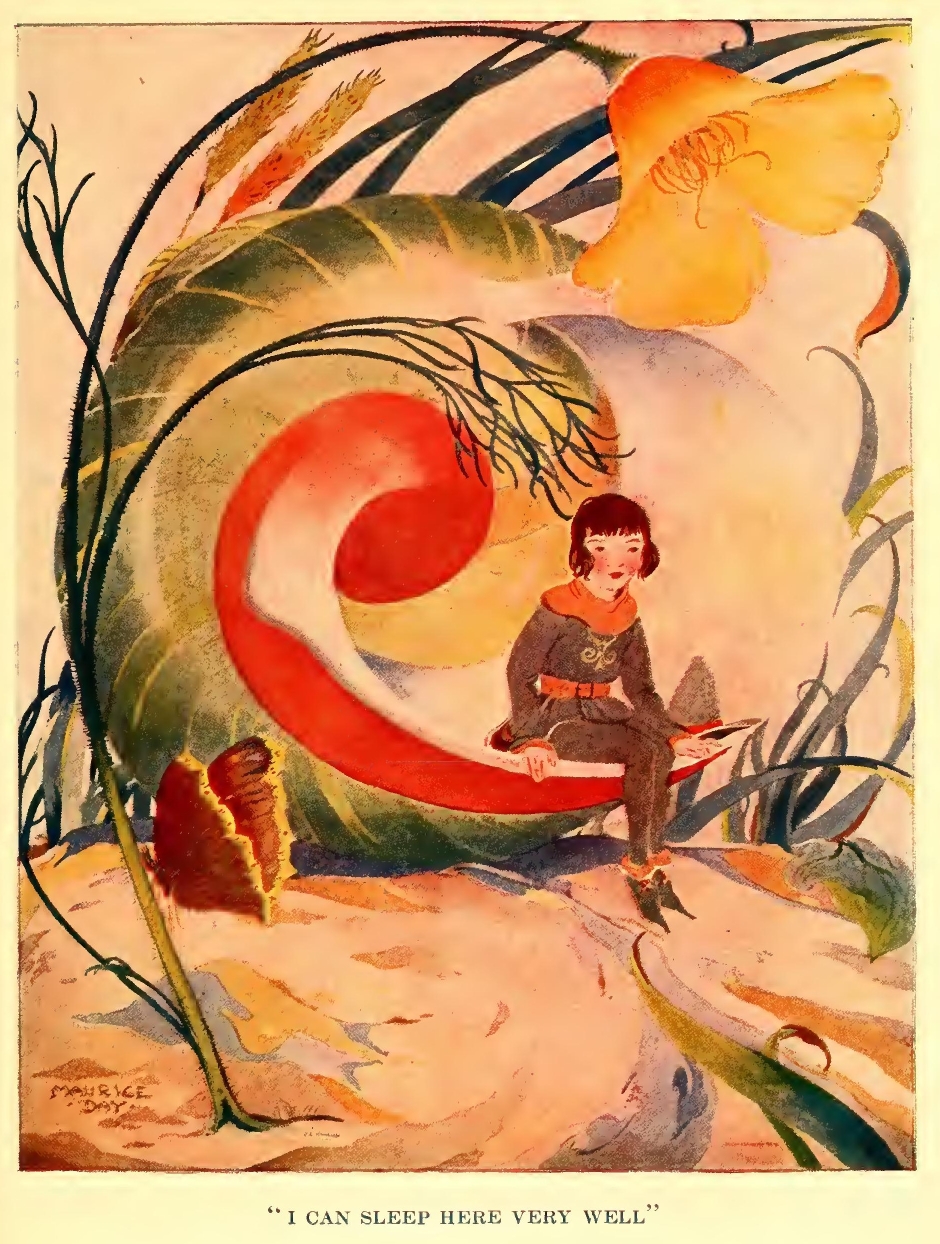
“This is lucky,” said he. “I can sleep here very well,” and in he crept. Just as he was falling asleep he heard two men pass by, and one said to the other:—
“How shall we manage to steal that rich farmer’s silver and gold?”
“I’ll tell you!” cried Tom.
“What noise was that? I am sure I heard some one speak,” said the thief. He was in a great fright. They both stood listening, and Tom spoke up:—
“Take me with you, and I will show you how to get the farmer’s money.”
“But where are you?”
“Look about on the ground, and listen where the sound comes from.”
“What a little chap! What can you do for us?”
“Why, I can get between the iron window bars, and throw you out whatever you want.”
“That is a good thought. Come along; we will see what you can do.”
When they came to the farmer’s house, Tom slipped through the bars into the room, and then called out as loud as he could:—
“Will you have all that is here?”
“Softly, softly!” said the thieves. “Speak low, or you will wake somebody.”
Tom made as if he did not understand them, and bawled out again:—
“How much will you have? Shall I throw it all out?”
Now the cook lay in the next room, and hearing a noise, she raised herself in her bed and listened. But the thieves had been thrown into a fright and had run away. By and by they plucked up courage, and said:—
“That little fellow is only trying to make fools of us.” So they came back and spoke low to him, saying: “Now let us have no more of your jokes, but throw out some of the money.” Then Tom called out again as loud as he could:—
“Very well! Hold your hands; here it comes.”
The cook heard this plainly; she sprang out of bed, and ran to open the door. The thieves were off as if a wolf were after them, and the cook could see nothing in the dark. So she went back for a light, and while she was gone, Tom slipped off into the barn.
The cook looked about and searched every hole and corner, but found nobody; she went back to bed, and thought she must have been dreaming with her eyes open. Tom crawled about in the hayloft, and at last found a good place to rest in. He meant to sleep till daylight, and then find his way home to his father and mother.
Poor Tom Thumb! his troubles were only begun. The cook got up early to feed the cows. She went straight to the hayloft, and carried away a large bundle of hay, with the little man in the middle of it fast asleep. He slept on, and did not wake till he found himself in the mouth of a cow. She had taken him up with a mouthful of hay.
“Dear me,” said he, “how did I manage to tumble into the mill?” But he soon found out where he was, and he had to keep all his wits about him, or he would have fallen between the cow’s teeth, and then he would have been crushed to death. At last he went down into her stomach.
“It is rather dark here,” said he; “they forgot to build windows in this room to let the sun in.” He made the best of his bad luck, but he did not like his resting-place at all. The worst of it was, that more and more hay was coming down, and there was less and less room to turn round in. At last he cried out as loud as he could:—
“Don’t bring me any more hay! don’t bring me any more hay!” The cook just then was milking the cow. She heard some one speak, but she saw nobody. Yet she was sure it was the same voice she had heard in the night. It put her into such a fright that she fell off her stool and upset her milk-pail. She ran off as fast as she could to the farmer, and said:—
“Sir, sir, the cow is talking.” But the farmer said:—
“Woman, thou art surely mad.” Still, he went with her into the cow-house, to see what was the matter. Just as they went in, Tom cried out again:—
“Don’t bring me any more hay! don’t bring me any more hay!” Then the farmer was in a fright. He was sure the cow must be mad, so he gave orders to have her killed at once. The cow was killed, and the stomach with Tom in it was thrown into the barnyard.
Tom soon set himself to work to get out, and that was not a very easy task. A hungry wolf was prowling about. Just as Tom had made room to get his head out the wolf seized the stomach and swallowed it. Off he ran, but Tom was not cast down. He began to chat with the wolf, and called out:—
“My good friend, I can show you a famous treat.”
“Where is that?”
“In the house near the wood. You can crawl through the drain into the kitchen, and there you will find cakes, ham, beef, and everything that is nice.” This was the house where Tom Thumb lived. The wolf did not need to be asked twice. That very night he went to the house and crawled through the drain into the kitchen. There he ate and drank to his heart’s content.
After a while he had eaten so much that he was ready to go away. But now he could not squeeze through the drain. This was just what Tom had thought of, and the little chap set up a great shout.
“Will you be quiet?” said the wolf. “You will wake everybody in the house.”
“What is that to me?” said the little man. “You have had your frolic; now I have a mind to be merry myself.” And he began again to sing and shout as loud as he could.
The woodman and his wife were awakened by the noise, and peeped through a crack into the kitchen. When they saw a wolf there, they were in a great fright. The woodman ran for his axe, and gave his wife a scythe.
“You stay behind,” said the woodman.
“When I have knocked the wolf on the head, you run at him with the scythe.” Tom heard all this, and said:—
“Father! father! I am here. The wolf has swallowed me.”
“Heaven be praised!” said the woodman. “We have found our dear child again. Do not use the scythe, wife, for you may hurt him.” Then he aimed a great blow, and struck the wolf on the head, and killed him at once. They opened him, and set Tom Thumb free.
“Ah!” said his father, “what fears we have had for you!”
“Yes, father,” he answered. “I have traveled all over the world since we parted, and now I am very glad to get fresh air again.”
“Where have you been?”
“I have been in a mouse-hole, in a snail-shell, down a cow’s throat, and inside the wolf, and yet here I am again, safe and sound.”
“Well, well,” said his father. “We will not sell you again for all the riches in the world.”
So they hugged and kissed their dear little son, and gave him plenty to eat and drink. And they bought him new clothes, for his old ones had been quite spoiled on his journey.
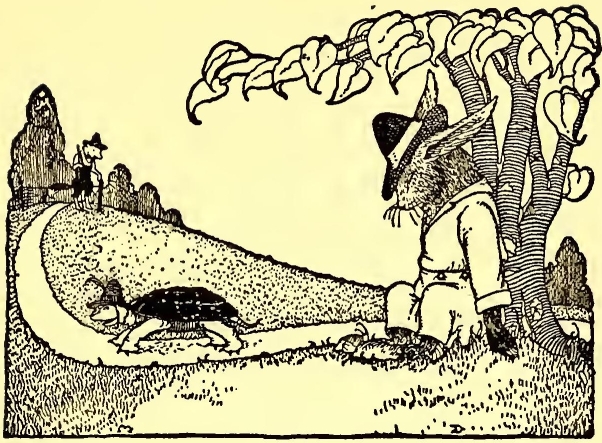
A Hare once made fun of a Tortoise.
“What a slow way you have!” he said. “How you creep along!”
“Do I?” said the Tortoise. “Try a race with me, and I will beat you.”
“You only say that for fun,” said the Hare. “But come! I will race with you. Who will mark off the bounds, and give the prize?”
“Let us ask the Fox,” said the Tortoise.
The Fox was very wise and fair. He showed them where they were to start, and how far they were to run.
The Tortoise lost no time. She started at once, and jogged straight on.
The Hare knew he could come to the end in two or three jumps. So he lay down and took a nap first. By and by he awoke, and then ran fast. But when he came to the end, the Tortoise was already there!
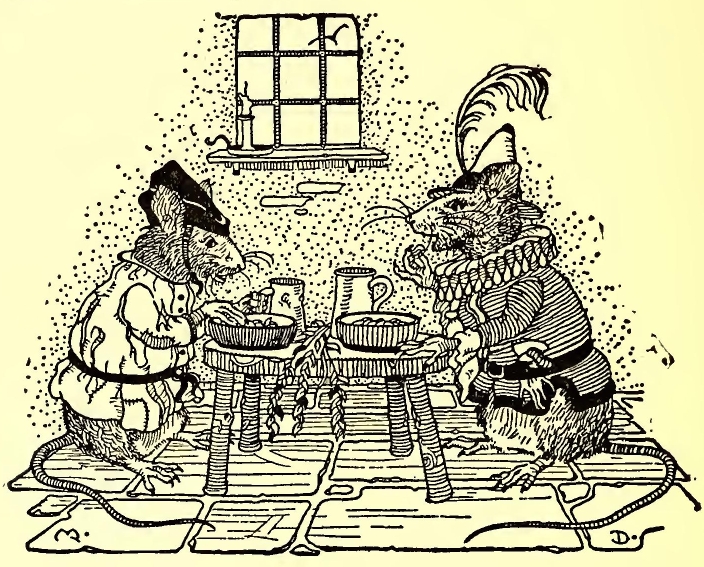
A Country Mouse had a friend who lived in a house in town. Now the Town Mouse was invited by the Country Mouse to take dinner with him. Out he went, and sat down to a dinner of barley and wheat.
“Do you know, my friend,” said he, “that you live a mere ant’s life out here? Now, I have plenty at home. Come and enjoy the good things there with me.”
So the two set off for town. There the Town Mouse showed the other his beans and meal, his dates, his cheese and fruit and honey.
As the Country Mouse ate, drank, and was merry, he praised his friend and bewailed his own poor lot.
But while they were urging each other to eat heartily, a man suddenly opened the door. Frightened by the noise, they crept into a crack. By and by, when he had gone, they came out and tasted of some dried figs. In came another person to get something that was in the room. When they caught sight of him, they ran and hid in a hole.
At that the Country Mouse forgot his hunger, and with a sigh, said to the other:—
“Please yourself, my good friend; eat all you want and get rich,—and be in a fright the whole time. As for me, I am a poor fellow, I know, who have only barley and wheat. But I am content to live on those, and have nothing to frighten me.”
Those who have the plain things of life are often better off than the rich.
A Gnat once lit on a Bull’s horn, and stayed there a long while.
When he was about to fly away, he asked the Bull if he would like to have him go now.
“Why,” said the Bull, “I did not know you were there.”
People often think themselves important when, in truth, no one is noticing them.
Once upon a time there lived a king and queen who grieved that they had no child. But at last a daughter was born, and the king was very happy. He gave a great feast, and asked to it all the fairies in the land, seven in all. He hoped that each would give the child a gift.
In front of each fairy at the table was set a heavy gold plate, and by each plate a gold knife and fork. Just as they sat down to the feast, in came an old fairy who had not been invited. No one knew she was living. Fifty years before she had shut herself up in a tower, and had not been seen since.
The king hurried off to find a gold plate and knife and fork for her also. But nothing could be found so fine as the seven plates which had been made for the seven fairies. The old fairy thought herself ill-used and grumbled in a low voice. At that, one of the young fairies feared she meant mischief to the child, and so, when the feast was over, hid herself behind the hangings in the hall. We shall soon see why she did this.
The fairies now began to give gifts to the child, beginning with the youngest. She gave her beauty; the next gave her wit; the third gave her grace; the fourth said she should dance perfectly; the fifth gave her a voice to sing; the sixth said she should play beautifully on the harp.
The turn of the old fairy had now come. She shook her head wickedly and said the child would grow up, but when she was grown, she would pierce her hand, when spinning, and die of the wound. At this, all the company began to weep. But the fairy who had hidden came forward and said:—
“Be of good cheer, king and queen. Your daughter shall not so die. I cannot entirely undo what my elder has done. The princess must pierce her hand when spinning, but instead of dying she shall fall into a deep sleep. The sleep shall last a hundred years. At the end of that time a king’s son will come to wake her.”
The king was very sad, but he hoped he might prevent the evil. So he made a law that no one in the kingdom should spin or have a spinning wheel in the house, under pain of instant death.
All went well for fifteen years. Then it chanced that the princess was with the king and queen in one of their castles, and was spying about for herself. She came to a little chamber at the top of a tower, and there sat an honest old woman spinning. She was very old and deaf, and had never heard of the king’s command.
“What are you doing?” asked the princess.
“I’m spinning, my pretty child.”
“How charming it is!” said the princess. “How do you do it? Let me try if I can spin.” She seized the spindle, but she was hasty and careless, and pierced her hand with its point. She fainted, and the old woman, in great alarm, ran for help. People came running from all sides, but they could not rouse her.
The king heard the noise and came also. Then he saw that the cruel fairy had had her wish. His daughter would not wake for a hundred years. He laid her on the bed in the best room, and stood sadly looking upon her. She was asleep. He could hear her breathe. Her cheeks were full of color, but her eyes were closed.
Now the good fairy, who had said the princess should wake in a hundred years, was thousands of miles away at the time. But she knew of it, and came at once in a chariot of fire drawn by dragons. The king came to meet her, his eyes red with weeping.
The good fairy was very wise and saw that the princess would not know what to do if she awoke all alone in the castle, in a hundred years. So this is what she did.
She touched with her wand every one in the castle except the king and the queen. She touched the maids of honor, the gentlemen, the officers, the stewards, cooks, boys, guards, porters, pages, footmen. She touched the horses in the stable, the grooms, the great mastiff in the court-yard, and the tiny lapdog of the princess that was on the bed beside her.
The moment she touched them, they all fell asleep just as they were, not to wake again until the time came for their mistress to do so. Then they all would be ready to wait on her. Even the fire went to sleep, and the roasting-spit before the fire with its fowls ready for roasting.
It was the work of a moment. The king and queen kissed their daughter good-by and left the castle. The king sent forth a command that no one was to go near the castle. That was needless. In a quarter of an hour, a wood had grown about it so thick and thorny that nothing could get through it. The castle-top itself could only be seen from afar.
After a few years the king and the queen died. They had no other child, and the kingdom passed into the hands of a distant family. A hundred years went by. The son of the king who was then reigning was out hunting one day, when he noticed the tower of a castle in the distance. He asked what castle it was.
All manner of answers were given to him. One said It was a fairy castle; another said that a great monster lived there. At last an old man said:—
“Prince, more than fifty years ago I heard my father say that there was in that castle the most beautiful princess ever seen. She was to sleep for a hundred years, and was to be waked at last by the king’s son, who was to marry her.”
The young prince at these words felt himself on fire. He had not a doubt that he was the one to awaken the princess. He set out at once for the wood, and when he drew near, the trees and thorns opened to offer him a path.
He was on a long, straight road, and at the end was the castle in full view. He turned to look for his comrades. Not one was to be seen. The wood had closed again behind him. He was alone, and all was still about him. Forward he went and came to the castle-gate. He entered the court-yard, and stood still in amazement.
On every side were the bodies of men and animals. But the faces of the men were rosy; it was plain that they were asleep. His steps sounded on the marble floor. He entered the guard-room. There the guards stood drawn up in line, with their spears in their hands, but they did not move. They were fast asleep.
He passed through one room after another; people were asleep in chairs, on benches, standing, sitting, lying down. He entered a beautiful room, covered with gold, and saw the most wonderful sight of all.
There lay a maiden so fair that she seemed to belong to another world. He drew near and knelt beside her. She did not stir. Her hand lay on her breast, and he touched his lips to it.
As he did this, her eyes opened and looked at the young man. She smiled, and said:—
“Have you come, my prince? I have waited long for you.”
The prince hardly knew how to answer. But he soon found his voice, and they talked for hours, and then had not said half that was in their heads to say.
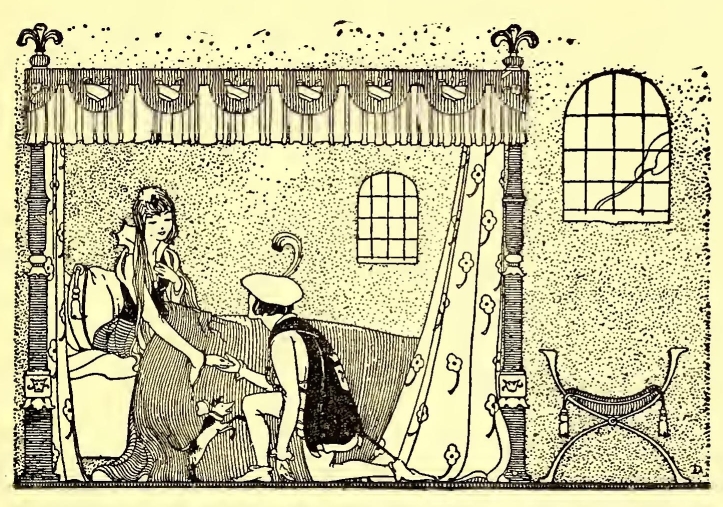
The moment that the princess waked, her little lapdog waked also. The great mastiff in the court-yard awoke; the horses in the stable and the grooms awoke; the footmen, the pages, the porters, the guards, the boys, the cooks, the stewards, the officers, the gentlemen, and the maids of honor, all awoke. The fire began to burn again, the spits turned round, and the fowls began to roast.
So, while the prince and the princess forgot the hours in talk, these people began to be hungry. The maids of honor went to the princess to tell her that they all waited for her. Then the prince took the princess by the hand and led her into the hall.
She was dressed in great splendor. But the prince did not hint that she looked as the picture of his great-grandmother looked. He thought her all the more charming for that, but he did not tell her so. The musicians played excellent but old music at supper. After supper the prince and princess were married in the chapel of the castle.
The next day they left the castle. All the people followed them down the long path. The wood opened again to let them through. Outside they met the prince’s men, and glad they were to see the prince once more. He turned to show them the castle, but there was no castle to be seen, and no wood.
The prince and princess rode gayly away, and when the old king and queen died, they reigned in their stead.
On a warm day in summer, an Ant was busy in the field gathering grains of wheat and corn, which he laid up for winter food. A Grasshopper saw him at work, and laughed at him for toiling so hard, when others were at ease.
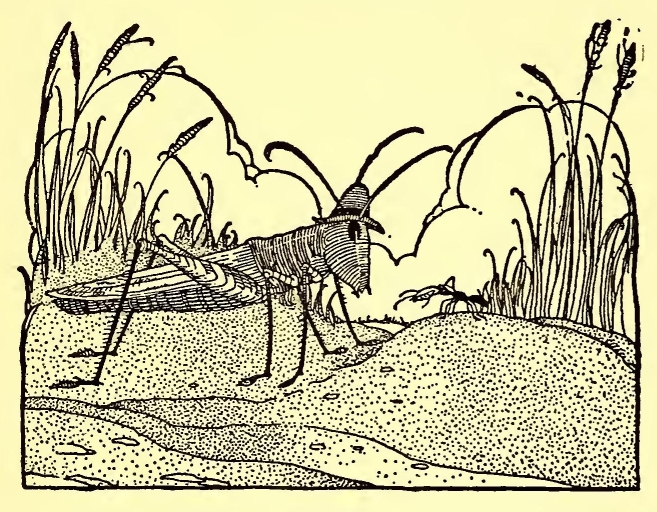
The Ant said nothing. But afterwards, when winter came, and the ground was hard, the Grasshopper was nearly dead with hunger. He came to the Ant to beg something to eat. Then the Ant said to him:—
“If you had worked when I did, instead of laughing at me, you would not now be in need.”
A Lion that had grown old, and had no more Strength to forage for food, saw that he must get it by cunning. He went into his den and crept into a corner, and made believe that he was very sick.
All the animals about came in to take a look at him, and, as they came, he snapped them up. When a good many beasts had been caught in this way, the Fox, who guessed his trick, came along. He took his stand a little way from the den, and asked the Lion how he did.
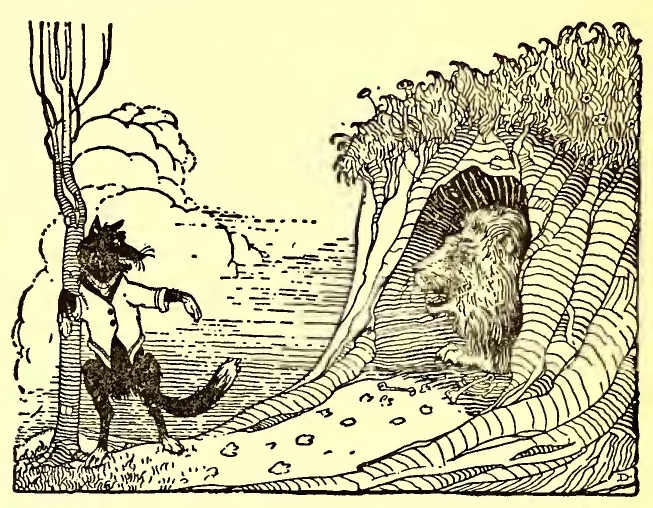
The Lion said he was very sick, and begged him to come into the den to see him.
“So I would,” said the Fox, “but I notice that all the footprints point into the den, and none point out.”
In the olden times there lived in the country, In England, a boy by the name of Dick Whittington.
He did not know who his parents were, for he had been born and brought up in the poor-house. There he was cruelly treated. When he was seven years of age, he ran away and lived by what he could get from kind people.
He heard that the streets of London were paved with gold. Being now a sturdy youth, he set out for the city to make his fortune. He did not know the way, but he fell in with a carter, who was bound for London, and he followed the cart. When night came, he helped the carter by rubbing down the horses, and for this he was paid with a supper.
He trudged on day after day, until they came to the famous city. The carter was afraid Dick would hang about him and give him trouble. So he gave him a penny and told him to begone and find some work.
Dick went from street to street, but he knew no one. He was ragged and forlorn, and looked like a beggar. Nobody gave him anything to do. Once in a while some one gave him something to eat, but at last he had nothing.
For two days he went about hungry and almost starved, but he would rather starve than steal. At the end of the second day he came to a merchant’s house in Leadenhall Street, and stood before it, weary and faint. The ill-natured cook saw him and came out and said:—
“Go away from here, or I will kick you away!” He crept off a little distance and lay down on the ground, for he was too weak to stand. As he lay there, the merchant who lived in the house came home, and stopped to speak to him. He spoke sharply, and told him to get up, that it was a shame for him to be lying there.
Poor Dick got up, and after falling once, through faintness and want of food, made out to say that he was a poor country boy, nearly starved. He would do any work if he might have food.
Mr. Fitzwarren, the merchant, took pity on him. He brought him into the house, and bade the servants look after him. He gave him a place under the cook, and this was the beginning of Dick’s fortune. But Dick had a hard time of it. The servants made sport of him. The ill-natured cook said:—
“Do you know what you are to do? You are to come under me. So look sharp. Clean the spits and the pans, make the fires, wind up the roasting-jack, and do nimbly all the dirty work I set you about, or else I will break your head with my ladle, and kick you about like a foot-ball.” This was cold comfort, but it was better than starving. “What gave him more hope was the kind notice he had from his master’s daughter, Mistress Alice. She heard Dick’s story from her father, and called for the boy. She asked him questions, and he was so honest in his answers, that she went to her father, and said:—
“That poor boy whom you brought into the house is a good, honest fellow. I am sure he will be very useful. He can clean shoes, and run errands, and do many things which our servants do not like to do.”
So Dick was kept, and a cot bed was given him in the garret. He was up early and worked late. He left nothing undone that was given him to do. For all that, he could not please the cook, who was very sour to him. Still, he bore her blows rather than leave so good a home. Then the cook told tales about him, and tried to get him sent away, but Mistress Alice heard of it. She knew how ill-tempered the cook was, and so she made her father keep Dick.
This was not the whole of Dick Whittington’s trouble. The garret where he lay at night had long been empty, and a great number of mice had made their home in it. They ran over Dick’s face, and kept up such a racket that he knew not which was worse, the cook by day or the mice by night.
He could only hope that the cook might marry or get tired of the place, and that he might in some way get a cat. It chanced, soon after, that a merchant came to dinner, and as it rained hard, he stayed all night. In the morning Dick cleaned the merchant’s shoes and brought them to his door. For this service the merchant gave him a penny.
As he went through the street on an errand that morning, he saw a woman with a cat under her arm. He asked her the price of the cat.
“It is a good mouser,” said the woman: “you may have it for a sixpence.”
“But I have only a penny,” said Dick. The woman found that she really could get nothing more, so she sold the cat to Dick for a penny. He brought it home, and kept it out of the way all day for fear the cook would see it. At night he took the cat up to the garret, and made her work for her living. Puss soon rid him of one plague.
When Mr. Fitzwarren sent out a ship to trade with far countries, he used to call his servants together, and give each a chance to make some money, by sending out goods in the ship. He thought that thus his ship had better fortune.
Now he was again making a venture, and each of the servants brought something to send; all but Whittington. Mistress Alice saw that he did not come, and she sent for him, meaning to give him some simple goods, that he too might have a share in the venture.
When, after many excuses, he was obliged to appear, he fell on his knees, and prayed them not to jeer at a poor boy. He had nothing he could claim for his own but a cat, which he had bought with a penny given him for cleaning shoes.
Upon this Mistress Alice offered to lay something down for him. But her father told her the custom was for each to send something of his own. So he bade Dick bring his cat, which he did with many tears, and gave her over to the master of the ship.
The cook, and indeed all the servants, after this plagued Dick, and jeered at him so much for sending his cat, that he could bear it no longer. He said to himself that he would leave the house and try his fortune elsewhere.
He packed his bundle one night, and the next day, early, set forth to seek his fortune. He left the house behind him, but his heart began to sink. However, he would not turn back, but kept on. At last he sat down in the field to think.
Just then the Bow Bells, that is, the bells of a church in Bow Street, began to ring merrily. Dick heard them, and as they rang, he fancied he heard them sing,—
“Turn again, Whittington,
Lord Mayor of London.”
That was a fine song to hear, and Dick began to pluck up heart again.
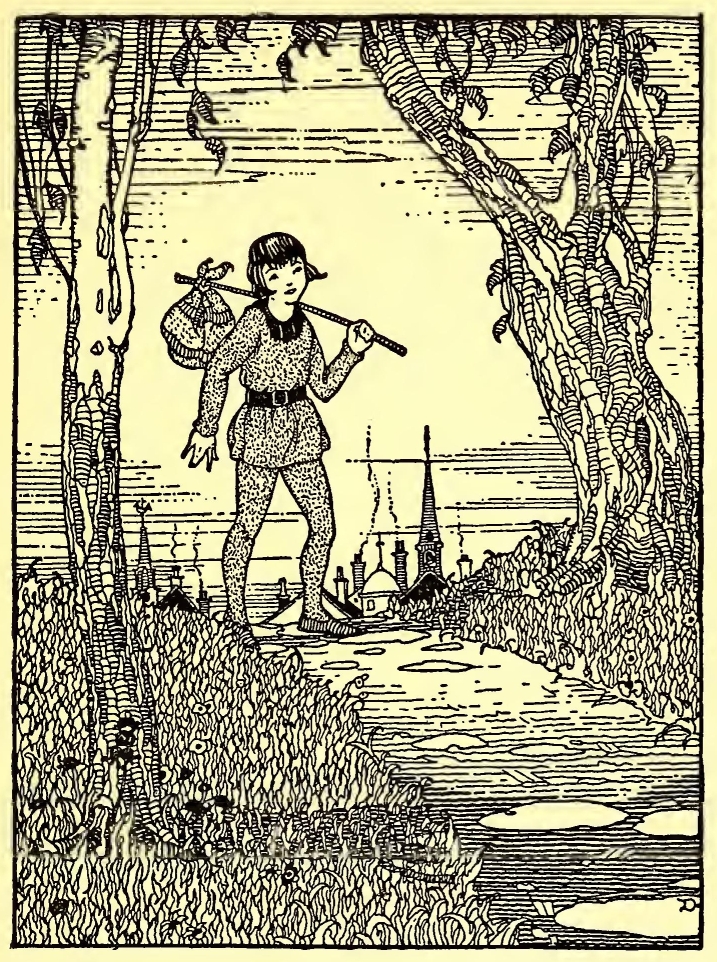
Still the bells rang. It was very early; no one was yet astir at the merchant’s house, and Dick, with new courage, took up his bundle, obeyed the bells, and walked quickly back to the house. He had left the door open, so he crept in and took up his daily task. About this time, the ship which carried Dick’s cat was driven by the winds, and came to a place on the Barbary coast, where the English seldom went. The people received the master of the ship well, and he traded with them. As his wares were new, they were very welcome. At last the king of that country, being greatly pleased, sent for the captain to come and dine at the palace.
The dinner was not set on a table, but the cloth was laid on the floor, as this was the custom of the country. The guests sat cross-legged before the feast. But when the dishes were set down, the smell of the dinner brought a great company of rats, and these rats helped themselves without fear.
The master of the ship was amazed, and asked the nobles if it was not very unpleasant to have this swarm of rats.
“Oh,” said they, “very much so. The king would give half his wealth to be rid of them. They not only come to the table, but they make free with his chamber and even his bed.”
“Well,” said the captain, thinking at once of Dick’s cat, “I have an English beast on board my ship which will quickly clear the palace of all the rats.”
“Say you so?” said the king, when he heard of this. “For such a thing I will load your ship with gold, diamonds, and pearls.” At that the shrewd captain made much of the cat.
“She is the most famous thing in the world,” said he. “I cannot spare her, for she keeps my ship clear of rats, or else they would spoil all my goods.” But the king would not take no for an answer.
“No price shall part us,” he said. So the cat was sent for, and the table was again spread. The rats came as before, but the captain let the cat loose, and she made short work of them. Then she came purring and curling up her tail before the king, as if she would have her reward.
The king was so pleased with the cat, that he gave ten times more for her than for all the goods in the ship. Then the ship sailed away with a fair wind, and arrived safe at London. She was the richest ship that ever entered port.
The master took the box of pearls and jewels with him on shore, and went straight to the merchant’s house. He gave his account to Mr. Fitz-warren, who was greatly pleased at the fortunate voyage, and called his servants together, to receive their profit. Then the master showed the box of pearls and jewels, and told the story of Whittington’s cat, and how Puss had earned this wealth.
“Call Mr. Whittington,” said Mr. Fitzwarren. “I will not take one farthing from him.”
Now Dick was in the kitchen cleaning pots and pans. When he was told that the merchant had sent for “Mr. Whittington,” he thought every one was making fun of him, and he would not go.
At last, he went as far as the door. The merchant bade him come in, and placed a chair for him. At that poor Dick was sure they were making fun of him, and the tears came into his eyes.
“I am only a simple fellow,” he said. “I do not mean harm to any one. Do not mock me.”
“Indeed, Mr. Whittington, we are serious with you,” said the merchant. “You are a much richer man than I am,” and he gave him the box of pearls and jewels worth quite three hundred thousand pounds.
At first Dick could not believe his good fortune. When at last he was persuaded, he fell upon his knees and thanked God who had been so good to him. Then he turned to his master and wished to give him of his wealth, but Mr. Fitzwarren said:—
“No, Mr. Whittington. I will not take a penny from you. It is all yours.”
At that Dick turned to Mistress Alice, who also refused. He bowed low, and said:—
“Madam, whenever you please to make choice of a husband, I will make you the greatest fortune in the world.”
Then he gave freely to his fellow servants. Even to his enemy, the cook, he gave a hundred pounds.
Richard Whittington was now a rich man. He laid aside his poor clothes, and was dressed well and handsomely. He had grown strong and tall in service, and was indeed a fine man to look upon.
He was well behaved and of a good mind and heart. Mr. Fitzwarren made him known to the other merchants, and let him see how business was carried on. Then, seeing that he was as honest and good as he was rich, he told Whittington that he might have his daughter in marriage.
At first, Dick felt himself unworthy of Mistress Alice. But he saw that she looked kindly on him, and he remembered how good she had been to him from the beginning. So he made bold to ask Mistress Alice to be his wife, and they had a grand wedding.
After the wedding was over, Mr. Fitzwarren asked him what he meant to do, and Mr. Whittington said he would like to be a merchant. So the two became partners, and grew to be very rich.
Rich as he was, this merchant never forgot that he was once poor Dick Whittington. The promise of Bow Bells came true, and three times he was chosen Lord Mayor of London. He fed the hungry, and cared for the poor.
When he was Lord Mayor of London the third time, it was his duty to receive King Henry V and his queen at Guildhall, which was the Mayor’s palace. It was just after a famous war with France, which England had won.
The king, at the feast, made the lord mayor a knight, so that now he was Sir Richard Whittington. There was a very pleasant fire on the hearth at the time. It was made of choice wood. Mace and other spices were mixed with the wood. The king praised the fire, and Sir Richard said,—“I will make it still more pleasant.” At that he threw upon the flames one piece of paper after another. They were the written promises of the king, to pay back money lent to him by London merchants, when he was carrying on the war. Sir Richard had bought them for sixty thousand pounds. That was the way he paid the king’s debt, for now there was nothing to show that the king owed anything.
This is the story of Dick Whittington and his cat. How much is true, and how much was made up, I do not know, for what happened took place five hundred years ago.
A Cat and a Monkey were sitting one day by the hearth, watching some chestnuts which their master had laid down to roast. The chestnuts had begun to burst with the heat, and the Monkey said to the Cat:—
“It is plain that your paws were made to pull out those chestnuts. Your paws are, indeed, exactly like our master’s hands.”
The Cat was greatly flattered by this speech, and reached forward for the tempting chestnuts. Scarcely had she touched the hot ashes than she drew back with a cry, for she had burned her paw. She tried again, and made out to get one chestnut. Then she pulled another, and a third, though each time she singed the hair on her paws.
When she could pull no more, she turned, and found the Monkey had taken this time to crack the chestnuts and eat them.
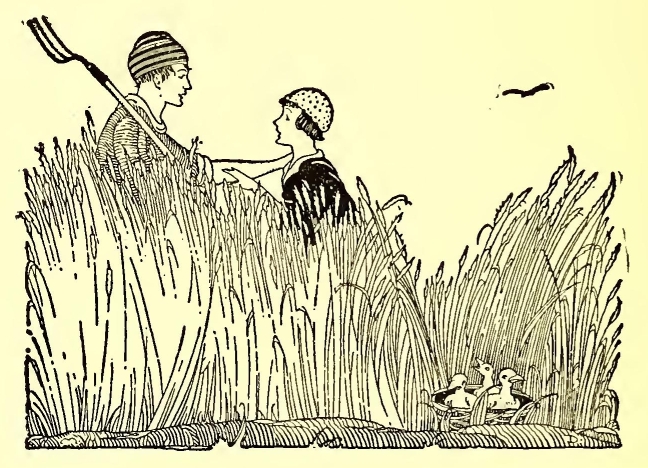
There was a brood of young Larks in a field of corn, which was just ripe. The mother, looking every day for the reapers, left word, whenever she went out in search of food, that her young ones should tell her all the news they heard.
One day, when she was absent, the master came to look at his field. “It is time,” said he, “to call in my neighbors and get my corn reaped.” When the old Lark came home, the young ones told their mother what they had heard, and begged her to move them at once.
“Time enough,” said she. “If he trusts to his neighbors, he will have to wait awhile yet for his harvest.”
Next day, the owner came again, and found the sun hotter, the corn riper, and nothing done.
“There is not an hour to be lost,” said he. “We cannot depend upon our neighbors. We must call in our relations.” Turning to his son, he said, “Go, call your uncles and cousins; and see that they begin to-morrow.”
The young Larks, in great fear, told their mother what the farmer had said. “If that be all,” said she, “do not be frightened. The relations have harvest work of their own. But take notice of what you hear next time, and be sure to let me know.”
She went abroad the next day, and the owner coming, and finding the grain falling to the ground because it was over ripe, said to his eon, “We must wait no longer for our neighbors and friends. Do you go to-night and hire some reapers, and we will set to work ourselves tomorrow.”
When the young Larks told their mother this,
“Then,” said she, “it is time for us to be off. When a man takes up his business himself, instead of leaving it to others, you may be sure that he means to set to work in earnest.”
A Pot of Honey was upset in the pantry, and the Flies crowded about to eat of it. It was so sticky that they could not get away. Their feet were held fast, so that they could not fly, and they began to choke to death.
“What wretches we are,” they cried, “to die just for a moment of pleasure!”
So it is that greediness is the cause of many evils.
There was once a rich merchant who had six children, three sons and three daughters. He loved them more than he loved all his riches, so that he was always seeking to make them happy and wise.
The daughters were very pretty; but the youngest was more than pretty—she was beautiful. As every one called her Little Beauty when she was a child, and she became more lovely every year, the name grew up with her, so that she had no other than just—Beauty.
Now Beauty was as good as she was beautiful. But her elder sisters were ill-natured and jealous of her, and could not bear to hear her called Beauty. They were very proud, too, of their father’s riches, and put on great airs. They would not visit the daughters of other merchants, but were always following persons who had titles, Lady This and Duchess That. They laughed at Beauty, who lived quietly at home with their father.
The father was so rich that many great merchants wished to marry his daughters. But the two eldest always said that they could never think of marrying anybody below a duke, or at the least an earl. As for Beauty, she thanked her lovers for thinking so well of her, but as she was still very young, she wished to live a few years longer with her father.
Now it happened that the merchant all at once lost his great wealth. Nothing was left but one small house in the country, and there the poor man told his children they must now go, and earn their daily bread.
The two eldest daughters said they need not go, for they had plenty of lovers who would be glad enough to marry them, even though they had lost their fortune. But they were wrong, for their lovers would not look at them now, and jeered at them in their trouble, because they had been so proud before.
Yet every one felt sorry for Beauty. Several gentlemen who loved her begged her still to let them marry her, though she had not a penny. Beauty refused, and said she could not leave her father now that trouble had come upon him.
So the family went to live in the small house in the country. There the merchant and his three sons ploughed and sowed the fields, and worked hard all day. Beauty rose at four o’clock every morning, put the house in order, and got breakfast for the whole family. It was very hard at first, for no one helped her. But every day it grew easier to work, and Beauty grew stronger and rosier. When her work was done, she could read, or play on her harp, or sit at her spinning-wheel, singing as she spun.
As for her two sisters, they were idle and unhappy, and became quite helpless. They never got up till ten o’clock. They spent the day moping and fretting, because they no longer had fine clothes to wear, and could not go to fine parties. They jeered at Beauty, and said that she was nothing but a servant-girl after all, to like that kind of living. But Beauty did not mind them, and lived on cheerfully.
They had been in the country a year, when one morning the merchant had a letter. It brought the news that a ship laden with rich goods belonging to him had not been lost after all, and had just come into port. The two sisters were half wild with joy, for now they could soon leave the farm-house, and go back to the gay city.
When their father was about to go to the port to settle his business there, they begged him to bring back all manner of fine things for them.
Then the merchant asked Beauty:—
“And what shall I bring you, Beauty?” for Beauty had yet asked nothing.
“Why, since you ask me, dear father, I should like you to bring me a rose, for none grow in these parts.” Now Beauty did not care so very much for a rose, but she did not like to seem to blame her sisters, or to appear better than they, by saying that she did not wish for anything.
The good man set off; but all was not as he had hoped. The ship had come in, but there was a dispute about the cargo. He went to law, and it ended in his turning back poorer than when he left his home.
He set out to return to the farm-house. When he was within thirty miles of home, he came to a large wood through which he must pass. The snow began to fall, and covered the path. The night closed in, and it grew so dark and so cold that the poor man gave himself up for lost. He could not see the way, and he was faint with cold and hunger.
All at once, he saw a light at the end of a long avenue of trees. He turned into the avenue, and rode until he came to the end of it. There he found a great palace; the windows were all lighted, and the door stood open, but he saw no one.
The door of the stable was also open, and his horse walked in. A crib full of hay and oats was there, and the tired beast fell to eating heartily. The merchant left his horse in the stall and entered the palace. He saw nobody and heard nobody, but a fire was burning on the hearth, and a table was spread with choice food, and set for one person. He was wet to the skin, and went to the fire to dry himself, saying:—
“I hope the master of the house or his servants will not blame me for this. No doubt some one will soon come.”
He waited, but no one came. The clock struck eleven. Then, faint for want of food, he went to the table and ate some meat, yet all the time in a great fright. But when he was no longer hungry, he began to pluck up courage, and to look about him.
The clock struck twelve. He left the hall, and passed through one room after another until he came to one where there was a bed. It was made ready, and, since he was very tired, he lay down and slept soundly.
The merchant did not wake until ten o’clock the next morning. He had placed his clothes on a chair by the side of the bed. They had been nearly ruined by the storm, and were besides old and worn. Now he saw a wholly new suit in their place.
He began to think he must be in the palace of some fairy, and he was sure of it when he looked out of the window. The snow had gone, and a lovely garden lay before him, full of flowers. He dressed and went back to the hall. A table was spread for breakfast, and he at once sat down to it. Then he went to get his horse. On the way he passed some roses. He remembered Beauty, and plucked a rose to take home with him.
As soon as he had done this, he heard a frightful roar, and saw a dreadful Beast coming toward him. He was so frightened that he nearly fell down. The Beast cried out in a loud voice:—
“Ungrateful man! I saved your life by letting you come into my palace. I gave you food to eat and a bed to rest in, and now you steal my roses, which I love beyond everything. You shall pay for this with your life!” The poor man threw himself on his knees before the Beast, saying:—
“Forgive me, my lord. I did not know I was doing wrong. I only wanted to pluck a rose for one of my daughters. She asked me to bring one home to her. I pray you, do not kill me, my lord.”
“I am not a lord. I am a Beast. I hate soft words, and you will not catch me by any of your fine speeches. You say you have daughters. Well, I will forgive you, if one of them will come and die in your stead. But promise that, if they refuse, you will come back in three months.”
The merchant did not mean in the least to let one of his daughters die for him. But he wished to see his children once more before he died, so he promised to return if one of his daughters would not die for him. The Beast then told him to go back to the room where he had slept. There he would find a chest. He might fill it with anything he found in the palace, and it would be sent after him.
The merchant did as he was bid. The floor of the room was covered with gold, and he filled the chest. If he must die, he would at least provide for his children. Then he took his horse and rode out of the wood, and came at last to his home. He held the rose in his hand, and as the daughters came out to meet him, he gave it to the youngest, saying:—
“Take it, Beauty. You little know what it has cost your poor father;” and then he told all that had happened since he left home.
The two eldest daughters began to cry aloud, and to blame Beauty. Why did she ask for roses? Why did she not ask for dresses, as they did; then all would have gone well. Now the hard-hearted thing, they said, did not shed a tear. Beauty replied quietly that it was of little use to weep. She meant to go and die in her father’s stead.
“No, no!” cried the three brothers. “We will go and seek this Beast, and either he or we must die!”
“It is all in vain,” said the father. “You do not know the Beast. He is more mighty than you can think. No! you must stay and care for your sisters. At the end of three months I shall go back and die.” The merchant then went to his room, and there he found the chest of gold.
He was greatly amazed. He had forgotten the promise of the Beast. But he said nothing about the chest to his daughters. He was sure they would tease him to go back to town to live.
Beauty said little, but when the three months were over, she made ready to go with her father. The brothers and sisters bade them good-by, and wept over Beauty. The brothers wept real tears, but the sisters rubbed their eyes with onions, so as to make tears; they did not really care.
The horse took the right road, as if he knew the way, and when he came to the palace, he went at once to the stable. The merchant and Beauty entered the palace. They found the table spread for two persons, and they sat down to it.
After supper there was a great roar as before, and the Beast entered. Beauty trembled, and the Beast turned to her and said:—
“Did you come of your own self?”
“Yes,” said Beauty, still trembling.
“Then I thank you. But you, sir,” and he turned to the father, “get you gone to-morrow, and never let me see your face again. Goodnight, Beauty.”
“Good-night, Beast,” she replied, and Beast walked off. The merchant begged and begged his daughter to leave him, and to go back to her home. But she was firm, and when the morning came, she made him leave her.
“Surely,” he thought, “Beast will not hurt Beauty.”
Beauty wept, but she was a brave girl, and soon she dried her eyes, and began to walk through the palace. She came to a door, and over it was written Beauty’s Room. She opened the door, and found herself in a fine chamber, with books, music and a harp, and many beautiful things.
“It cannot be that I have only a day to live,” she said, “for why should all this be done for me?” She opened a book and saw written in letters of gold: Your wishes and commands shall be obeyed. You are here the queen over everything.
“Alas!” she thought, “I wish most of all I could see my father and know what he is doing.” Just then her eyes fell on a large looking-glass, and in it she saw her father just reaching home. Her sisters came out to meet him. They tried to look sad, but it was plain that they were not sorry to see him come home alone.
The sight in the glass was only for a moment, then it faded, and Beauty turned away and in her mind thanked Beast for what he had done.
At noon she found dinner ready for her, and sweet music sounded as she ate. But she saw nobody. At night Beast came and asked leave to sup with her. Of course she could not say no, but she sat in a fright all through supper. He did not speak for some time. Then he said:—
“Beauty, do you think me very ugly?”
“Yes, Beast; I cannot tell a lie. But I think you are very good.” Nothing more was said, and Beauty was beginning to be rid of her fear, when all at once he asked:—
“Beauty, will you marry me?” Beauty was in a fright again, but she answered:—
“No, Beast.” He gave a great sigh which shook the house. Then he got up from the table and said:—
“Good-night, Beauty,” and went away. Beauty was glad he had gone, but she could not help pitying him.
Beauty lived in this way three months. The Beast came to supper every night. He did not grow less ugly, but Beauty did not mind his ugliness so much, for she saw how kind he really was. But there was one trouble. Every night the Beast was sure to ask:—
“Will you marry me, Beauty?” and Beauty always answered:—
“No, Beast.”
But one night he begged her at least never to leave him. Now it chanced on that very day Beauty had looked in her glass. There she saw her father sick with grief, for he thought his child was dead. Her sisters were married. Her brothers were soldiers. So she told all this to the Beast, and wept and said she should die if she could not see her father once more.
“Do not refuse to let me go!” she begged.
“No,” said the Beast. “I will not refuse you. I would much rather your poor Beast should die of grief for your absence. So you may go.”
“Oh, thank you, dear Beast,” said Beauty, “and I will surely come back in a week.”
“When you wish to come back, Beauty, lay your ring on the table before you go to bed, and you will find yourself here when you wake. Good-night, Beauty.”
“Good-night, Beast.”
The next morning Beauty woke to find herself at the farm-house. Her father was so glad to see her once more, and to know she was alive and well, that his sickness left him at once. He sent for her sisters, who came and brought their husbands.
These husbands were not much to be praised. One was so vain that he looked at himself, and seldom looked at his wife. The other had a sharp tongue, and liked to use it on other people, and most of all on his own wife. So the sisters were no happier than they had been.
But they were still jealous of Beauty, and they laid a plan for her hurt. They thought if they could keep her at home after the week was over, the Beast would be so angry, he would soon make an end of her. So, at the end of the week, they made a great ado, and begged her to stay just a little longer. Beauty could not help being glad to have her sisters want her. She said she would stay one week more; but she was not quite easy in her mind.
On the night of the tenth day the sisters gave her a feast, in order to make her forget the Beast. But at night Beauty dreamed she saw poor Beast lying half dead on the grass in the palace garden. She woke in tears, and at once laid her ring on the table, and then went to sleep again.
When she awoke, she was once more in her room at the palace. All day she wished for supper time to come. Then she would see Beast again. But supper time came, and no Beast was at the table. Nine o’clock struck, and still Beast did not come.
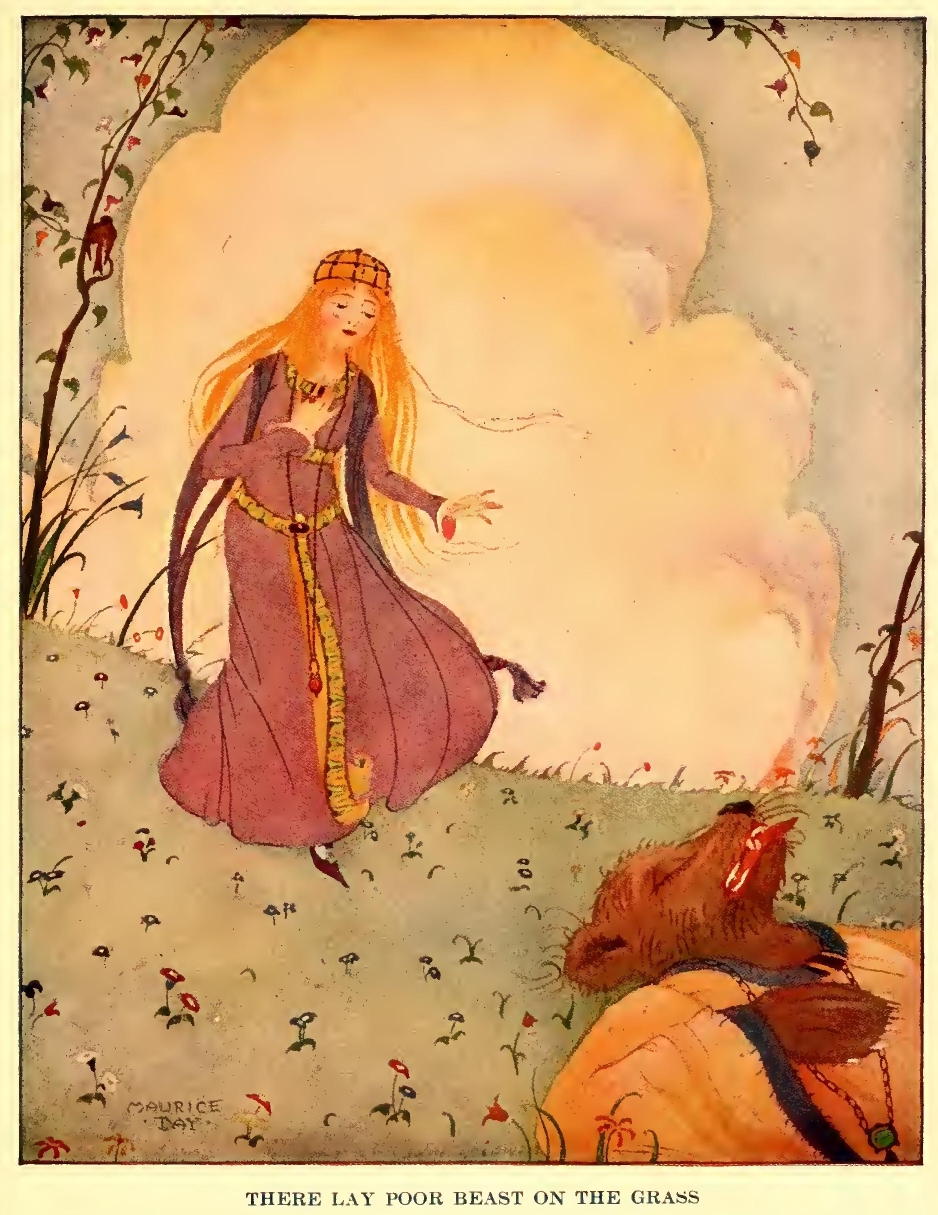
Beauty flew into the garden. She went to the spot she had dreamed of, and there lay poor Beast on the grass. She felt his heart beat. He was still alive. She ran for some water and threw it on his face. The Beast opened his eyes and said in a faint voice:—
“You forgot your promise. I could not live without you, and I meant to starve to death. Now you have come, and I shall die happy.”
“No! you shall not die, dear Beast,” cried Beauty. “You shall live to be my husband, for now I feel I really love you.”
At these words the whole palace was ablaze with light. Music sounded, and there was a stir all about. There was no Beast, but in his place a very handsome prince was at Beauty’s feet.
“You have broken the charm that held me,” he said.
“But where is my poor Beast?” asked Beauty, weeping. “I want my dear Beast.”
“I was the Beast,” said the Prince. “A wicked fairy had power to make me live in that ugly form, till some good and beautiful maid should be found, so good as to love me in spite of my ugliness.”
Beauty was amazed, but she took the Prince’s hand and they went into the palace. The people of the country were full of joy. They had mourned for their Prince, and now he had suddenly come back again, and with him was a beautiful princess. So Beauty and the Beast, who was no longer a Beast, reigned happily in the kingdom.
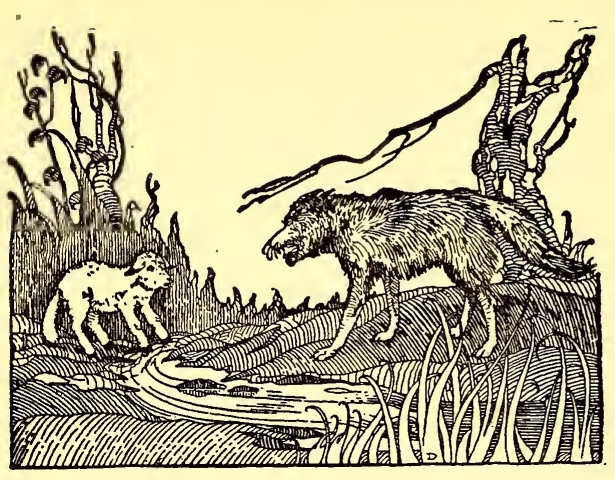
A Wolf saw a Lamb drinking at a brook, and set about finding some good reason for catching him. So he went to a place a little higher up the brook, and called out:—
“How dare you muddle the water that I am drinking?”
“How can I,” said the Lamb, humbly, “when I drink with the tips of my lips only? And, besides, the water runs from you to me, not from me to you.”
“Well, you called my father names a year ago,” said the Wolf, finding another reason.
“I was not born a year ago,” said the poor lamb.
“You may make ever so good excuses,” said the Wolf, finally; “I shall eat you all the same.”
This fable teaches that, when one has made up his mind to do wrong, he is not stopped by the best of reasons.
Two friends were walking along the road, when a Bear came suddenly upon them.
One of them got first to a tree, and climbed up into it and hid among the branches.
The other, who was slower, fell flat upon the ground, and made believe that he was dead.
When the Bear came up to him, and poked him with his nose, he held his breath; for it is said that this animal will not touch a dead man. The Bear went off, and the Man who was in the tree came down, and asked the other what the Bear had whispered.
“He told me,” said the other, “not to travel with friends who would desert me when danger came.”
This fable teaches that misfortunes sometimes show which Of our friends are true friends.
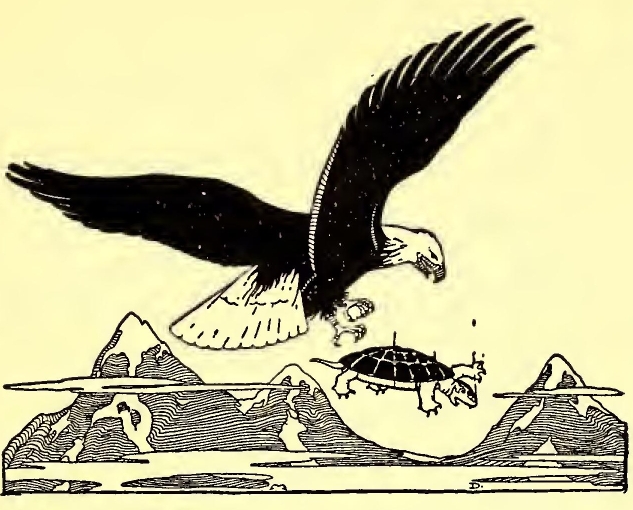
A Tortoise, seeing an Eagle in flight, wanted much to fly like him. So she asked him if he would not teach her to fly.
He told her that it was impossible; that Tortoises could not fly. All the more did she urge him; so at last the Eagle seized her in his claws, bore her to a great height, and then, letting her go, bade her fly.
She fell like a stone to the earth, and the blow knocked the breath out of her body.
This fable teaches that men who are envious, and refuse to take the advice of those who know more than themselves, are apt to get into trouble.
A King had three sons, handsome, brave, and generous. Some persons about the court, however, made him believe that these sons were eager to have him die, because each wanted to be king. This was not at all true, but the King believed it, and made a plan to get them out of the way. He sent for them and said:—
“My dear sons, you must see that I am growing old, and cannot attend to state affairs as I once used to. It is right that I should make one of you king in my stead. But first I should like something to amuse me when I am no longer king. I think I should like best a little dog. Now, the one of you who brings me the most perfect little dog shall be king in my stead.”
The princes were much surprised at the fancy of their father to have a little dog, but they all agreed to do as he had asked. They bade him good-by, and promised to come back in a year. They went off together to an old palace three miles away. There they had something to eat, and then set off on separate roads. But they agreed to meet again at the palace at the end of the year.
Now, we will see what happened to the youngest of the three brothers. He went from town to town looking for handsome dogs. He bought one, and then, when he found a handsomer dog, he bought that and gave the other away.
At last he found himself in a wood. Night came on, and it began to rain. There were thunder and lightning, and he lost his way. He groped about and saw a light in the distance. He went toward it, and soon was in front of a fine palace.
The door to the palace was of gold, studded with sapphires, and these shone with a bright light. This was the light the Prince had seen. The walls of the palace were of fine china, and there were wonderful paintings upon them. These paintings showed the adventures of all the fairies from the beginning of the world.
The Prince saw a deer’s foot hanging by the side of the door. It was hung at the end of a chain of diamonds, and was plainly a bell-pull. He was greatly astonished, for he saw no one, and he wondered that thieves had not long ago stolen the diamonds and the sapphires.
He pulled the deer’s foot and heard a bell ring. Soon the golden door opened. He saw nobody, but he saw twelve Hands in the air, each holding a torch. He looked and did not know what to do. Then he felt himself gently pushed from behind, so he walked on into the palace. There he heard a voice singing:—
“Welcome, Prince, no danger fear,
Mirth and love attend you here.”
The Hands with the torches led him through one door after another, into one room after another. Each room was more splendid than the last. Finally the Hands drew a chair near a fire, and beckoned him to sit down.
The Hands he saw were white and fair. They took away his wet clothes, and brought him new fine linen, and a warm wrapper in which he sat before the fire. Then they placed before him a glass upon a stand, and began to comb and brush his hair gently. They brought a bowl with perfumed water in it, and washed his face and hands.
Now the Prince was fresh and warm, and the Hands gave him a princely suit of clothes. When he was dressed, they led him out of the chamber to a grand hall. Here a table was set with rich and dainty food. Two plates were on the table, and the Prince wondered who was to eat with him.
Just then he looked up and saw a small figure coming toward him. It was covered with a long black veil, and was not more than a foot high. On each side walked a cat dressed in black, and behind came a great number of cats, some carrying cages full of rats, and others mouse-traps filled with mice.
The Prince did not know what to think. The little figure drew near, and drew aside her veil. It was a cat, a beautiful White Cat, but looking sad and gentle. She said to the Prince:—
“You are welcome, Prince. It makes me glad to have you come.”
“Madam,” said the Prince, “I thank you for all your goodness to me. I cannot help thinking you must be a wonderful being, to have this beautiful palace, to be able to speak, and yet to be a cat!”
“That is true,” said the Cat, “but I do not like to talk, and I do not like to hear fine things said to me. Let us sit down to supper.”
The Hands then placed some dishes on the table, in front of the Prince and the White Cat.
The Prince had a pie made of young pigeons, but the White Cat had one made of fat mice. The Prince at first did not like to touch his food. He was not quite sure what it was, but the White Cat told him not to be afraid. The dishes before him had no bit of rat or mouse in them.
When supper was over, the Prince noticed that the White Cat carried a little picture hung by a cord upon one of her feet. He asked to look at it. It was a portrait of a young man. To his great surprise, it was his own likeness.
He did not ask the White Cat to explain this, for she had a look which forbade him. They talked together about many things, and then the White Cat bade the Prince good-night. The Hands, with torches, led him to his chamber, and there he slept.
He was waked in the morning by a noise outside. He got up, and the Hands brought him a handsome hunting-jacket. The noise kept on, and he looked out of the window. There he saw more than five hundred cats in the open space before the palace. They were making ready for a hunt.
The White Cat soon came and asked him to join their sport, and he was given a wooden horse to ride on. The White Cat mounted a monkey. She wore a dragoon’s cap, which made her look very bold and fierce.
The horns sounded, and away they went. The cats ran faster than the hares and rabbits, and when they caught any, they brought them to the Prince and the White Cat. They chased birds as well as rabbits. Up the trees they went, and the White Cat on the monkey climbed more quickly than any, and mounted the highest trees, to the eagle’s nest.
When the chase was over, they all went back to the palace. The White Cat sat down at the table with the Prince, and they had a fine supper. Again the Hands led the Prince to his chamber, and he slept soundly.
So it went on day after day. Every day there was some new pleasure, and the White Cat was so gentle, so sweet, and so thoughtful, that the Prince could not bear to think of leaving the palace.
“How can I go away from you?” he cried one day. “Can you not make me a cat to live here always? or, can you not make yourself a lady?” But the White Cat only smiled, and made no answer.
At last a year had almost gone. The White Cat knew what day the Prince must return to his father, and told him that he had but three days left.
“Alas!” said the Prince. “What shall I do? I have not yet found a dog small enough.”
“Never fear,” said the White Cat. “I will see that you have a dog, and I will also give you a wooden horse, so that you can ride home in a few hours.”
When the day came, the White Cat gave the Prince an acorn, and told him to put it close to his ear. He did so, and could hear a little dog barking inside the acorn. He was delighted, and thanked the White Cat a thousand times.
The Prince mounted his wooden horse, and soon was at the place where he was to meet his brothers. The two eldest told their stories. The youngest kept silence, and showed only a cheap cur. The brothers trod on each other’s toes under the table, as much as to say, “We have nothing to fear from this dog.”
The next day they all went to the palace. The dogs of the two elder brothers were brought in on soft rugs; they were wrapped about in silk quilts, and it was hard to see anything of them. However, the King looked at each, and could not make up his mind which was the smaller and prettier. So the two princes began to quarrel.
At this the youngest son came forward. Nobody had looked at his cur, but now he showed them his acorn. He broke the shell, and out jumped a little dog. He held his finger ring, and the dog leaped through it. There was no doubt now who had the smallest and prettiest dog.
The King could not possibly find any fault with the dog, but he could not bear to give up his crown yet. So he thanked his sons for their trouble, and asked them to try once more. He wished them to be gone a year, and at the end of that time to bring him a fine piece of cambric. It must be fine enough to be drawn through the eye of a small needle.
The three princes thought this very hard, but they set off as before. The two eldest took different roads. The youngest mounted his wooden horse, and quickly came to the palace of the White Cat. There he was received with great joy. The Hands helped him to dismount, and the table was spread before him. The best food was given him, and the White Cat sat opposite. He told her what a hard task his father had set.
“Do not be troubled,” she said. “I have cats in my palace who can make just such cambric. So be at ease and enjoy yourself.”
The Prince knew how to enjoy himself. He talked with the White Cat about all sorts of things, and they hunted together. And when he was alone, he could think about the White Cat, and what she said last. Oh, yes, he knew how to enjoy himself.
Thus another year went by. At the end of the year the White Cat said to the Prince:—
“This time you must go in state.”
Then he saw in the yard a splendid carriage, covered with gold and diamonds. Twelve horses as white as snow were harnessed to it, and a troop of horsemen was ready to ride behind and by the side of the carriage. The White Cat bade the Prince good-by, and gave him a walnut.
“In this nut,” she said, “is the cambric. But you must not open the nut till you come before the King.”
Away went the horses, and carried the Prince in a twinkling to the King’s palace. His two brothers were already there. They all went into the King’s presence, and the eldest brought out his piece of cambric. No one had ever seen anything so fine. The King took the needle. The tip end of the cambric went through the eye, but the piece could not be pulled further.
The second son tried, but his piece failed also. Then the youngest Prince came forward with an elegant box, covered with jewels. He opened the box and took out the walnut. He smiled, and looked about, and cracked the shell. Then he looked sober. There was no cambric there, only a filbert.
However, he cracked the shell of the filbert. Out came a cherry-stone. He looked more serious still. The brothers and the lords of the court began to laugh. What could be more silly than this Prince with his cherry-stone!
The Prince now cracked the cherry-stone, and took out the kernel. He split it, and found a grain of wheat; he opened the grain of wheat, and there was a grain of millet-seed. All the court was now laughing. The Prince grew red in the face and muttered:—
“O White Cat, White Cat, you have deceived me.”
When he said this, he felt a scratch on his arm. He saw nothing, but it was just as if a cat scratched him. That brought him to his senses. He opened the millet-seed very carefully, and drew forth a piece of cambric. It was four hundred yards long, and was so fine that it was easily drawn through the eye of the needle.
The King could ask nothing more. But he was not ready to give up his crown, so he said to his sons:—
“You have done nobly. Now one of you must be king. But it will not do for one to be king without a queen. So go away and find the most beautiful woman in the world. At the end of the year come back. The one who brings the most beautiful woman shall marry her and have my kingdom.”
The three brothers set off again on their travels, and the youngest rode straight to the palace of the White Cat. He could not bear to speak or think of his errand. He was so happy, however, with the White Cat that he quite forgot everything for another year. At the end of that time, the “White Cat herself reminded him what he had to do.
“You must now go back to your father, but you shall take with you a beautiful princess. Cut off my head and my tail, and throw them into the fire.”
“I!” said the Prince. “I cut off your head and tail! How can I, when I love you so?”
“You must. That is the way to prove your love. If you love me, do as I bid you.”
The Prince looked at the White Cat. Her eyes said the same thing to him. He took his sword, and did as she bade him. No sooner had he done this than the White Cat was gone, and a beautiful princess stood before him. At the same moment the room was full of maids and gentlemen. All the cats were gone. The Prince was astonished. The beautiful princess sent away all the people, and then told the story of her life to the Prince.
“Do not think I have always been a cat. My father was a king, and had six kingdoms. He loved my mother dearly, and let her do just as she wished. She liked best to travel and to see new sights. One day she heard of a distant country where the fairies had a garden, and in this garden was the most delicious fruit ever eaten.
“She wished at once to taste this fruit, and so she set off for the country. She came to a noble palace and knocked at the gate. No one came out. She waited. No one appeared anywhere in sight. But over the garden wall she saw the fruit.
“My mother bade her servants pitch her tent close by the gate. There she stayed six weeks. Yet she saw no one go in or out. She was so vexed and so disappointed that at the end of six weeks she fell sick.
“One night, when she was almost dead, she opened her eyes and saw an old woman, small and ugly. It was one of the fairies who owned the garden. This old woman was sitting in a chair by the bed, and spoke to my mother.
“‘Why do you come here for our fruit?’ she asked. ‘My sisters and I do not like it at all. We did not mean you should have any. But now you are very ill, and we do not want you to die here; you may have all you want, if you will give us what we ask and then go away.’
“‘Oh,’ said my mother,’ I will give you everything I have, to the half of my kingdom, if you will only give me the fruit.’
“‘Very well. You will have a child. When the child is born, give her to us. We will take care of her, and she shall be a beautiful princess.’
“‘That is pretty hard,’ said my mother, ‘but I must have the fruit, or I shall die. So the child shall be yours.’
“Then my mother rose and dressed, and went into the garden. Here she ate her fill. Besides, she ordered four thousand mules to be loaded with the fruit, for it was of a kind that would never spoil. Thus she traveled back to my father. He was overjoyed to see her, and she said nothing of the promise she had given.
“By and by, however, she grew sad, and my father asked her what troubled her. Then she told him the whole story. At first he was greatly troubled, but he began to think how he should prevent the fairies from getting his child.
“As soon as I was born he had me taken to the top of a high tower. There were twenty flights of stairs leading up to the room in which I was placed. A door was at the foot of each flight, and was locked, and my father kept the key. He did not mean that any one should get at me.
“When the fairies heard of this, they were very angry. They sent forth a great dragon, and the dragon breathed forth fire, and burnt up the grass and trees. It was very fierce, too, and killed men, women, and children. So my father was filled with dismay, and sent word that the fairies should have me.”
I was placed in a cradle of mother-of-pearl, and carried to the palace by the garden where my mother had eaten the fruit. The dragon at once disappeared, and all went well in my father’s kingdom.
“The fairies gave me a room in a tower, and I had everything I could ask. Here I grew up. I knew nothing of my father or mother. The fairies came to see me, but they rode the dragon, and flew in at the window. You must know there was no door to the tower. There were windows, high up from the ground, and there was a garden upon the top of the tower.
“The fairies were very kind to me, and all went well. I played in the garden on the tower, and I had my birds and flowers. But one day I was sitting at one of the windows talking with my parrot, when I saw a fine-looking man below. He stood listening to the parrot and me.
“I never had seen a man except in pictures, and I was very glad to see this one. We spoke to each other through the window, and so it went on day after day. At last I thought I could not bear to live alone in the tower, and I planned to escape.
“I begged the fairies to bring me some cord and needles, to make a net with. There were birds flying about, and if I had a net I could catch one. They gave me these things, and I made a ladder which reached from my window to the ground.
“I meant to climb down the ladder, but before I could do so my lover had climbed up. He leaped in at my window. At first I was frightened, but then I was glad to have him with me. He gave me a picture of himself, but while we were talking the fairy Violent flew in at the window on the back of the dragon. She was in a great rage, and bade the dragon at once devour my lover.
“I tried to cast myself into the mouth of the dragon, for I no longer cared to live. But the fairy held me back, and said she had another punishment for me. She touched me with her wand, and I became at once a White Cat.
“She brought me to this palace, and gave me a troop of cats to wait on me. They were lords and ladies who had been turned into cats. The Hands were the hands of servants who could not be seen. Here I was to stay a cat until a prince should come who looked exactly like my lover, and who should cut off my head and my tail.
“My Prince, look at this picture. It is your exact image. You have saved me from the fairies, and I love you with all my heart.”
The Prince was overjoyed. He made haste to set out for his father’s palace with the beautiful princess. Again the brothers stood before the King, each with a beautiful princess. The King was now at his wit’s end, but the princess, who had lately been a White Cat, came forward and said:—
“O King, it is a thousand pities that you should give up your kingdom. You are not old. You are very wise, and ought to reign many years. I have six kingdoms. Let me give one to each of your two eldest sons. Then the youngest son and I will still have four kingdoms. More than all, you will not have to decide which of us three princesses is the most beautiful.” Everybody set up a shout. The three weddings took place at once, and the kingdoms were divided among the princes.
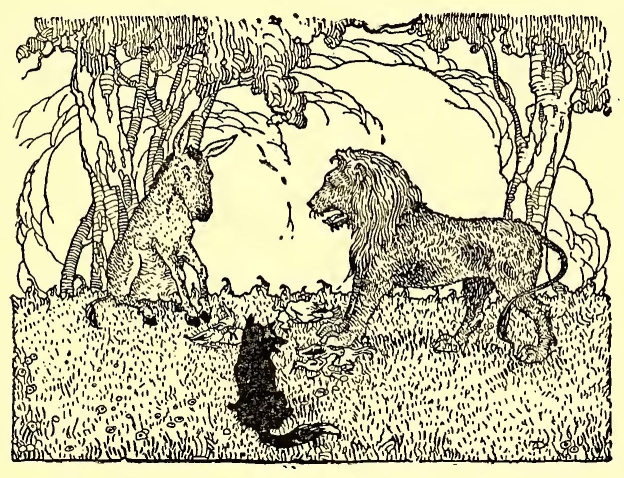
The Lion, the Ass, and the Fox made a bargain to hunt together. When they had caught a good supply of game, they came to eat it, and the Lion bade the Ass divide the spoils. So the Ass divided it into three equal parts, and called on each to choose his portion. At that the Lion fell into a rage, and made his supper off the Ass.
Then the Lion told the Fox to divide it, and he put almost all the game into one great heap for the Lion, and saved only a small bit for himself. Then the Lion said: “My good fellow, who taught you to divide so well?” And the Fox said: “That dead Ass there.”
A Jackdaw once looked into a dove-cote, and saw the Doves well fed and cared for; so he went away and daubed himself white, and then came back to make himself one of them. As long as he kept quiet they let him stay, thinking he was a Dove. But as soon as he opened his mouth to sing, they found out who he was, and drove him out of the dove-cote.
He, poor fellow, now went back to the Jackdaws. But they did not know him on account of his white coat, and would not let him join them.
And so, for wanting to get into two companies, he missed both.
This fable teaches that it is best for us to be content with our own kind. The greedy not only miss what they seek, but often lose what they have.
Four Bulls once agreed to live together, and they fed in the same pasture. Now the Lion saw them afar off, and wanted to hunt them, but he knew that he could not so long as they held together.
So he managed to set them quarreling with one another; and when that happened, they separated, and he easily mastered them one at a time.
A Country Maid was walking slowly along with a pail of milk upon her head. She was saying to herself:—
“The money for which I shall sell this milk will buy me three hundred eggs. These eggs will produce at least two hundred and fifty chickens. The chickens will be fit to carry to market about Christmas, when poultry always brings a good price. By May-day I shall have money enough to buy a new gown. Let me see—green suits me; yes, it shall be green. In this dress I will go to the fair, where all the young fellows will want me for a partner. But I shall refuse every one of them.” By this time she was so full of her fancy that she tossed her head proudly. Over went the pail, and all the milk was spilled on the ground.
Moral. Don’t count your chickens before they are hatched.
There was once a young Rabbit, a quiet, peace-loving Rabbit. He lived in a neat house, and made no trouble for any one. But one day he went to market to buy some parsley. A Weasel came slyly by and saw the little house. He slipped in and made himself at home. It was a good place to stay in, and there he meant to stay. By and by the Rabbit came home, and saw the Weasel at the window.
“Do you know that this is my house?” the Rabbit asked.
“Pooh, pooh!” said the Weasel, “what makes it yours? You only dug in the ground a little, and came in here where the earth was gone. Do you think you own the earth?”
“The law gives it to me,” said the Rabbit, “because I made it fit to live in. If you do not leave, I will call the police.”
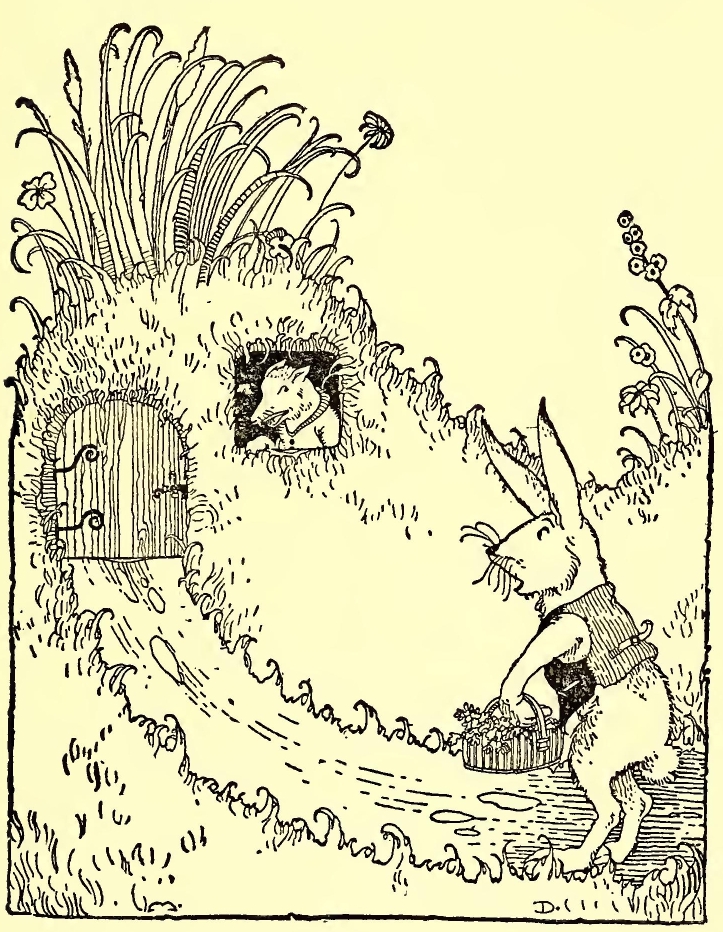
“The law, indeed!” said the Weasel; “and what right has the law to give away land? But we will have no more words. We will lay the matter before the Cat, and leave it to him.”
“Very well,” said the young Rabbit, and they went to find the Cat,—an old, wise, and strong Cat.
“Come nearer, my children,” said the Cat, as they both began to talk at the same time. “I am very deaf; nearer, for I wish to hear every word.”
They came close to the Cat, each talking loudly. But as soon as the Cat had them within reach, he darted his claws out on each side, and held them both fast. First he made way with the young Rabbit, next with the Weasel; and then the house belonged to him.
A Farmer had an Ass that had been a faithful servant to him a great many years. But the Ass was growing old, and every day was more and more unfit for work.
His master was tired of keeping him, and began to think of putting an end to him. But the Ass saw there was mischief in the wind and took himself off slyly. He set out toward the great city. “There,” thought he, “people will like to hear me bray, and I shall earn my living as a musician.”
He had traveled a little way when he spied a Dog by the wayside. The Dog was lying down, and panting as if he were very tired.
“What makes you pant so, my friend?” asked the Ass.
“Alas!” said the Dog, “my master was about to knock me on the head. I am old and weak, and can no longer hunt as I used. So I ran away. But how can I earn a living?”
“Hark ye,” said the Ass; “I am going to the great city to be a musician; suppose you go with me, and try what you can do in the same way.”
“Very well,” said the Dog, and they jogged on together.
They had not gone far before they saw a Cat sitting in the middle of the road. The Cat wore a very sad face.
“Pray, my good lady,” said the Ass, “what is the matter with you? You look quite out of sorts.”
“Ah me!” said the Cat, “well I may. How can I be in good spirits, when I fear for my life? I am beginning to grow old, and I like to lie at my ease by the fire, and not to run about the house after mice. So my mistress laid hold of me, and was about to drown me. I was lucky enough to get away from her. But what am I to live on?”
“Oh!” said the Ass, “come with us to the great city. You are a good night-singer, and may make your fortune as a musician.”
“Well said,” said the Cat, and she joined the party.
On they went, until they came to a farm-yard. There they saw a Cock perched upon the gate, and the Cock was crowing with all his might and main.
“Bravo!” said the Ass; “upon my word you make a famous noise; pray, what is all this about?”
“Why,” said the Cock, “I was just now saying that it was going to be fine weather, when lo! the cook claps her hands to her ears, and says she means to cut my head off, and make broth of me for the guests that are coming to-morrow.”
“What a shame!” said the Ass. “But come with us, Master Cock. It will be better than to stay here and have your head cut off. Besides, who knows? If we take care to sing in tune, we may get up some kind of concert; so, come along with us.”
“With all my heart,” said the Cock; and they all four went on their way.
They could not reach the great city the first day. So, when night came on, they went into the wood to sleep. The Ass and the Dog lay down under a great tree; the Cat climbed up and sat on a branch; the Cock flew up to the top of the tree, for that was a very safe place.
Before he went to sleep, he looked out on all sides to see if the world were quiet. Afar off he saw something bright, and he called out to the others:—
“There must be a house no great way off, for I see a light.”
“If that be the case,” said the Ass, “let us change our quarters, for our lodging here is not the best in the world.”
“So say I,” said the Dog. “I should not be the worse for a bone or two, or a bit of meat.” So off they all went to the spot where the Cock had seen the light. As they drew near, it became larger and brighter, till at last they came close to a house in which a gang of robbers lived.
The Ass was the tallest of the company, so he marched up to the window and peeped in.
“Well, Ass,” said the Cock, “what do you see?”
“What do I see? Why, I see a table spread with all sorts of good things, and men sitting round it, making merry.”
“That would be a fine place for us to live in,” said the Cock.
“Yes,” said the Ass, “if we only could get in.” So they all talked the matter over, and at last hit upon a plan. The Ass stood on his hind-legs, with his fore-feet resting on the window-sill; the Dog got upon his back; the Cat scrambled up to the Dog’s shoulders; and the Cock flew up and sat upon the Cat’s head.
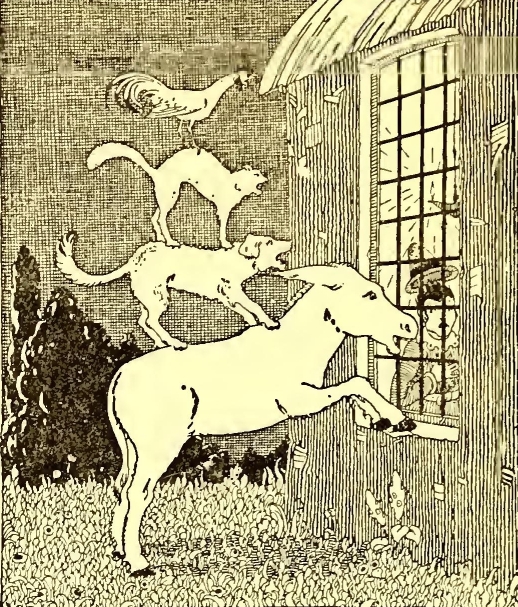
When all was ready, they began their music. The Ass brayed, the Dog barked, the Cat mewed, and the Cock crowed; and then they all broke through the window at once, and came tumbling into the room. The glass fell with a smash upon the floor, and there was a great clatter.
The robbers started when they heard the music. They were scared out of their wits when the Traveling Musicians came tumbling into the room. So they took to their heels at once.
As soon as they were gone, the Traveling Musicians sat down at the table. They ate all that the robbers had left, and as they were very hungry, they ate very fast.
Then, when they had cleared the table, they put out the lights, and each found a place in which to sleep. The Ass lay upon a heap of straw in the yard; the Dog stretched himself upon a mat behind the door; the Cat rolled herself up on the hearth before the warm ashes; and the Cock perched upon a beam at the top of the house. They were all tired and soon fell asleep.
After some time the robbers, who had not fled far, got over their fright. They saw that the lights were out, and that all was quiet. They began to think they had been frightened at nothing. One, bolder than the rest, crept back to the house. All was still; all was dark.
He made his way into the kitchen, and groped about to find a candle. He found the candle, and then went to the fire, as he thought, to light his candle. But the live coals which he thought he saw were the two fiery eyes of the Cat.
He held the candle close, to light it, but the Cat, not liking the joke, sprang at his face, and spit, and scratched him. Away he ran to the door. But there the Dog jumped up and bit him in the leg. As he was crossing the yard, the Ass kicked him, and the Cock, now awake, crowed with all his might.
At this the robber ran back to his comrades, as fast as his legs could carry him. He told them that a horrid witch had got into the house, and had spit at him, and scratched his face with long bony fingers. A man with a knife in his hand hid behind the door, and stabbed him in the leg. A black monster stood in the yard, and struck him with a club. And the judge sat upon the top of the house, and cried out:—
“Throw the rascal up here!”
After this, the robbers never dared to go back to the house. The Traveling Musicians were so pleased with their quarters, that they took up their abode there, and there they are, I dare say, at this very day.
There was a sly Cat in a house, and the Mice were so plagued with her at every turn, that they called a council to plan a way by which they might guard against being caught by her.
“If you will be ruled by me,” says one of the Mice, “there’s nothing like hanging a bell about the Cat’s neck, to give warning when Puss is coming.” They all thought that a capital plan.
“Well,” says another, “and now we are agreed upon the bell, say, who shall hang it upon the Cat’s neck?” But there was no one ready to bell the Cat.
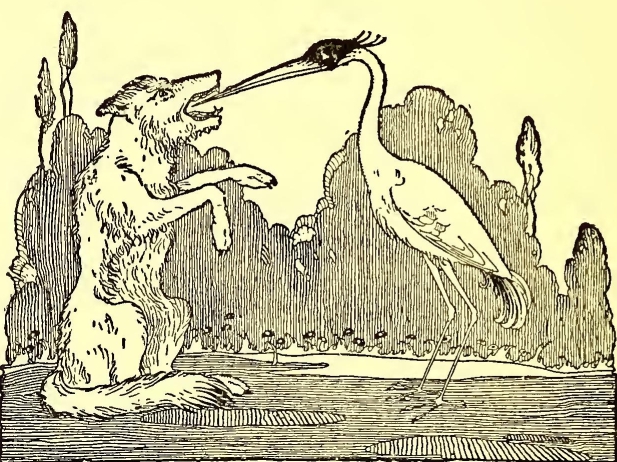
A Wolf once had a bone stuck in his throat, and offered to pay the Crane well if she would thrust her long bill down and draw the bone out.
When she had done this, she asked for her pay. Then the Wolf laughed, and showed his teeth, and said:—
“Is it not enough for you that you have had your head in a Wolf’s mouth, and have drawn it out again safely? What more do you want?”
A Wolf once walked behind a flock of Sheep, and did them no harm. At first, the Shepherd treated him as an enemy, and kept watch against him. But when the Wolf made no sign of hurting the Sheep, the Shepherd began to think he was quite as good as a watch-dog.
So one day, when the Shepherd wished to go to the city, he left the Sheep in the care of this quiet Wolf. That was the chance the Wolf wanted, and he made sad havoc with the flock. When the Shepherd came back and saw the Sheep scattered, he said:—
“It serves me right; for why did I trust Sheep to a Wolf?”
In old times, the Frogs lived in a free and easy way, each one as he pleased. But the elders among them did not like this, and begged Jove to send them a king.
Jove thought them very foolish, and tossed a log into the middle of the pond. The Frogs were scared out of their wits, and plunged at once into the deepest hole. By and by, they peeped out and saw that King Log was stock-still.
They began to grow bolder; soon they laughed at King Log. Then they jumped up and sat on the log. That was not a king, they said, and off they went to Jove, and asked him to give them a new king.
This time Jove gave them an Eel. But the Eel was stupid, and the Frogs liked him no better. They sent a third time to Jove.
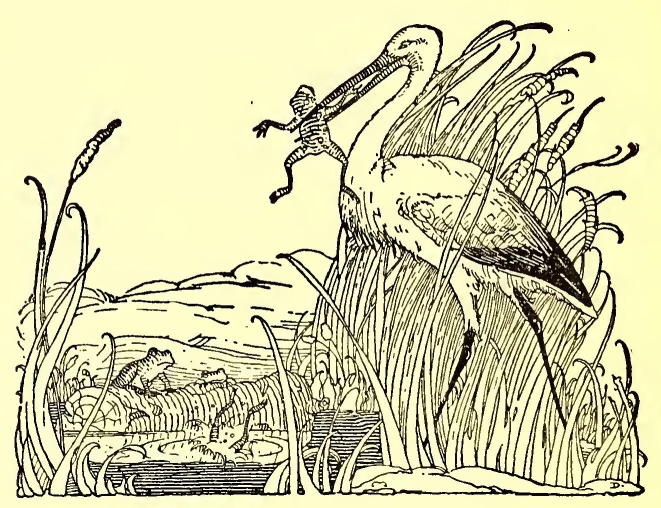
At this Jove was angry, and sent them a king of another sort. He sent them King Stork, and King Stork caught the Frogs, one by one, and ate them, till there was not one left.
End of the Project Gutenberg EBook of The Book of Fables and Folk Stories, by
Horace E. Scudder
*** END OF THIS PROJECT GUTENBERG EBOOK BOOK OF FABLES ***
***** This file should be named 45384-h.htm or 45384-h.zip *****
This and all associated files of various formats will be found in:
http://www.gutenberg.org/4/5/3/8/45384/
Produced by David Widger from page images generously
provided by the Internet Archive
Updated editions will replace the previous one--the old editions
will be renamed.
Creating the works from public domain print editions means that no
one owns a United States copyright in these works, so the Foundation
(and you!) can copy and distribute it in the United States without
permission and without paying copyright royalties. Special rules,
set forth in the General Terms of Use part of this license, apply to
copying and distributing Project Gutenberg-tm electronic works to
protect the PROJECT GUTENBERG-tm concept and trademark. Project
Gutenberg is a registered trademark, and may not be used if you
charge for the eBooks, unless you receive specific permission. If you
do not charge anything for copies of this eBook, complying with the
rules is very easy. You may use this eBook for nearly any purpose
such as creation of derivative works, reports, performances and
research. They may be modified and printed and given away--you may do
practically ANYTHING with public domain eBooks. Redistribution is
subject to the trademark license, especially commercial
redistribution.
*** START: FULL LICENSE ***
THE FULL PROJECT GUTENBERG LICENSE
PLEASE READ THIS BEFORE YOU DISTRIBUTE OR USE THIS WORK
To protect the Project Gutenberg-tm mission of promoting the free
distribution of electronic works, by using or distributing this work
(or any other work associated in any way with the phrase “Project
Gutenberg”), you agree to comply with all the terms of the Full Project
Gutenberg-tm License available with this file or online at
www.gutenberg.org/license.
Section 1. General Terms of Use and Redistributing Project Gutenberg-tm
electronic works
1.A. By reading or using any part of this Project Gutenberg-tm
electronic work, you indicate that you have read, understand, agree to
and accept all the terms of this license and intellectual property
(trademark/copyright) agreement. If you do not agree to abide by all
the terms of this agreement, you must cease using and return or destroy
all copies of Project Gutenberg-tm electronic works in your possession.
If you paid a fee for obtaining a copy of or access to a Project
Gutenberg-tm electronic work and you do not agree to be bound by the
terms of this agreement, you may obtain a refund from the person or
entity to whom you paid the fee as set forth in paragraph 1.E.8.
1.B. “Project Gutenberg” is a registered trademark. It may only be
used on or associated in any way with an electronic work by people who
agree to be bound by the terms of this agreement. There are a few
things that you can do with most Project Gutenberg-tm electronic works
even without complying with the full terms of this agreement. See
paragraph 1.C below. There are a lot of things you can do with Project
Gutenberg-tm electronic works if you follow the terms of this agreement
and help preserve free future access to Project Gutenberg-tm electronic
works. See paragraph 1.E below.
1.C. The Project Gutenberg Literary Archive Foundation (“the Foundation”
or PGLAF), owns a compilation copyright in the collection of Project
Gutenberg-tm electronic works. Nearly all the individual works in the
collection are in the public domain in the United States. If an
individual work is in the public domain in the United States and you are
located in the United States, we do not claim a right to prevent you from
copying, distributing, performing, displaying or creating derivative
works based on the work as long as all references to Project Gutenberg
are removed. Of course, we hope that you will support the Project
Gutenberg-tm mission of promoting free access to electronic works by
freely sharing Project Gutenberg-tm works in compliance with the terms of
this agreement for keeping the Project Gutenberg-tm name associated with
the work. You can easily comply with the terms of this agreement by
keeping this work in the same format with its attached full Project
Gutenberg-tm License when you share it without charge with others.
1.D. The copyright laws of the place where you are located also govern
what you can do with this work. Copyright laws in most countries are in
a constant state of change. If you are outside the United States, check
the laws of your country in addition to the terms of this agreement
before downloading, copying, displaying, performing, distributing or
creating derivative works based on this work or any other Project
Gutenberg-tm work. The Foundation makes no representations concerning
the copyright status of any work in any country outside the United
States.
1.E. Unless you have removed all references to Project Gutenberg:
1.E.1. The following sentence, with active links to, or other immediate
access to, the full Project Gutenberg-tm License must appear prominently
whenever any copy of a Project Gutenberg-tm work (any work on which the
phrase “Project Gutenberg” appears, or with which the phrase “Project
Gutenberg” is associated) is accessed, displayed, performed, viewed,
copied or distributed:
This eBook is for the use of anyone anywhere at no cost and with
almost no restrictions whatsoever. You may copy it, give it away or
re-use it under the terms of the Project Gutenberg License included
with this eBook or online at www.gutenberg.org
1.E.2. If an individual Project Gutenberg-tm electronic work is derived
from the public domain (does not contain a notice indicating that it is
posted with permission of the copyright holder), the work can be copied
and distributed to anyone in the United States without paying any fees
or charges. If you are redistributing or providing access to a work
with the phrase “Project Gutenberg” associated with or appearing on the
work, you must comply either with the requirements of paragraphs 1.E.1
through 1.E.7 or obtain permission for the use of the work and the
Project Gutenberg-tm trademark as set forth in paragraphs 1.E.8 or
1.E.9.
1.E.3. If an individual Project Gutenberg-tm electronic work is posted
with the permission of the copyright holder, your use and distribution
must comply with both paragraphs 1.E.1 through 1.E.7 and any additional
terms imposed by the copyright holder. Additional terms will be linked
to the Project Gutenberg-tm License for all works posted with the
permission of the copyright holder found at the beginning of this work.
1.E.4. Do not unlink or detach or remove the full Project Gutenberg-tm
License terms from this work, or any files containing a part of this
work or any other work associated with Project Gutenberg-tm.
1.E.5. Do not copy, display, perform, distribute or redistribute this
electronic work, or any part of this electronic work, without
prominently displaying the sentence set forth in paragraph 1.E.1 with
active links or immediate access to the full terms of the Project
Gutenberg-tm License.
1.E.6. You may convert to and distribute this work in any binary,
compressed, marked up, nonproprietary or proprietary form, including any
word processing or hypertext form. However, if you provide access to or
distribute copies of a Project Gutenberg-tm work in a format other than
“Plain Vanilla ASCII” or other format used in the official version
posted on the official Project Gutenberg-tm web site (www.gutenberg.org),
you must, at no additional cost, fee or expense to the user, provide a
copy, a means of exporting a copy, or a means of obtaining a copy upon
request, of the work in its original “Plain Vanilla ASCII” or other
form. Any alternate format must include the full Project Gutenberg-tm
License as specified in paragraph 1.E.1.
1.E.7. Do not charge a fee for access to, viewing, displaying,
performing, copying or distributing any Project Gutenberg-tm works
unless you comply with paragraph 1.E.8 or 1.E.9.
1.E.8. You may charge a reasonable fee for copies of or providing
access to or distributing Project Gutenberg-tm electronic works provided
that
- You pay a royalty fee of 20% of the gross profits you derive from
the use of Project Gutenberg-tm works calculated using the method
you already use to calculate your applicable taxes. The fee is
owed to the owner of the Project Gutenberg-tm trademark, but he
has agreed to donate royalties under this paragraph to the
Project Gutenberg Literary Archive Foundation. Royalty payments
must be paid within 60 days following each date on which you
prepare (or are legally required to prepare) your periodic tax
returns. Royalty payments should be clearly marked as such and
sent to the Project Gutenberg Literary Archive Foundation at the
address specified in Section 4, “Information about donations to
the Project Gutenberg Literary Archive Foundation.”
- You provide a full refund of any money paid by a user who notifies
you in writing (or by e-mail) within 30 days of receipt that s/he
does not agree to the terms of the full Project Gutenberg-tm
License. You must require such a user to return or
destroy all copies of the works possessed in a physical medium
and discontinue all use of and all access to other copies of
Project Gutenberg-tm works.
- You provide, in accordance with paragraph 1.F.3, a full refund of any
money paid for a work or a replacement copy, if a defect in the
electronic work is discovered and reported to you within 90 days
of receipt of the work.
- You comply with all other terms of this agreement for free
distribution of Project Gutenberg-tm works.
1.E.9. If you wish to charge a fee or distribute a Project Gutenberg-tm
electronic work or group of works on different terms than are set
forth in this agreement, you must obtain permission in writing from
both the Project Gutenberg Literary Archive Foundation and Michael
Hart, the owner of the Project Gutenberg-tm trademark. Contact the
Foundation as set forth in Section 3 below.
1.F.
1.F.1. Project Gutenberg volunteers and employees expend considerable
effort to identify, do copyright research on, transcribe and proofread
public domain works in creating the Project Gutenberg-tm
collection. Despite these efforts, Project Gutenberg-tm electronic
works, and the medium on which they may be stored, may contain
“Defects,” such as, but not limited to, incomplete, inaccurate or
corrupt data, transcription errors, a copyright or other intellectual
property infringement, a defective or damaged disk or other medium, a
computer virus, or computer codes that damage or cannot be read by
your equipment.
1.F.2. LIMITED WARRANTY, DISCLAIMER OF DAMAGES - Except for the “Right
of Replacement or Refund” described in paragraph 1.F.3, the Project
Gutenberg Literary Archive Foundation, the owner of the Project
Gutenberg-tm trademark, and any other party distributing a Project
Gutenberg-tm electronic work under this agreement, disclaim all
liability to you for damages, costs and expenses, including legal
fees. YOU AGREE THAT YOU HAVE NO REMEDIES FOR NEGLIGENCE, STRICT
LIABILITY, BREACH OF WARRANTY OR BREACH OF CONTRACT EXCEPT THOSE
PROVIDED IN PARAGRAPH 1.F.3. YOU AGREE THAT THE FOUNDATION, THE
TRADEMARK OWNER, AND ANY DISTRIBUTOR UNDER THIS AGREEMENT WILL NOT BE
LIABLE TO YOU FOR ACTUAL, DIRECT, INDIRECT, CONSEQUENTIAL, PUNITIVE OR
INCIDENTAL DAMAGES EVEN IF YOU GIVE NOTICE OF THE POSSIBILITY OF SUCH
DAMAGE.
1.F.3. LIMITED RIGHT OF REPLACEMENT OR REFUND - If you discover a
defect in this electronic work within 90 days of receiving it, you can
receive a refund of the money (if any) you paid for it by sending a
written explanation to the person you received the work from. If you
received the work on a physical medium, you must return the medium with
your written explanation. The person or entity that provided you with
the defective work may elect to provide a replacement copy in lieu of a
refund. If you received the work electronically, the person or entity
providing it to you may choose to give you a second opportunity to
receive the work electronically in lieu of a refund. If the second copy
is also defective, you may demand a refund in writing without further
opportunities to fix the problem.
1.F.4. Except for the limited right of replacement or refund set forth
in paragraph 1.F.3, this work is provided to you ‘AS-IS’, WITH NO OTHER
WARRANTIES OF ANY KIND, EXPRESS OR IMPLIED, INCLUDING BUT NOT LIMITED TO
WARRANTIES OF MERCHANTABILITY OR FITNESS FOR ANY PURPOSE.
1.F.5. Some states do not allow disclaimers of certain implied
warranties or the exclusion or limitation of certain types of damages.
If any disclaimer or limitation set forth in this agreement violates the
law of the state applicable to this agreement, the agreement shall be
interpreted to make the maximum disclaimer or limitation permitted by
the applicable state law. The invalidity or unenforceability of any
provision of this agreement shall not void the remaining provisions.
1.F.6. INDEMNITY - You agree to indemnify and hold the Foundation, the
trademark owner, any agent or employee of the Foundation, anyone
providing copies of Project Gutenberg-tm electronic works in accordance
with this agreement, and any volunteers associated with the production,
promotion and distribution of Project Gutenberg-tm electronic works,
harmless from all liability, costs and expenses, including legal fees,
that arise directly or indirectly from any of the following which you do
or cause to occur: (a) distribution of this or any Project Gutenberg-tm
work, (b) alteration, modification, or additions or deletions to any
Project Gutenberg-tm work, and (c) any Defect you cause.
Section 2. Information about the Mission of Project Gutenberg-tm
Project Gutenberg-tm is synonymous with the free distribution of
electronic works in formats readable by the widest variety of computers
including obsolete, old, middle-aged and new computers. It exists
because of the efforts of hundreds of volunteers and donations from
people in all walks of life.
Volunteers and financial support to provide volunteers with the
assistance they need are critical to reaching Project Gutenberg-tm’s
goals and ensuring that the Project Gutenberg-tm collection will
remain freely available for generations to come. In 2001, the Project
Gutenberg Literary Archive Foundation was created to provide a secure
and permanent future for Project Gutenberg-tm and future generations.
To learn more about the Project Gutenberg Literary Archive Foundation
and how your efforts and donations can help, see Sections 3 and 4
and the Foundation information page at www.gutenberg.org
Section 3. Information about the Project Gutenberg Literary Archive
Foundation
The Project Gutenberg Literary Archive Foundation is a non profit
501(c)(3) educational corporation organized under the laws of the
state of Mississippi and granted tax exempt status by the Internal
Revenue Service. The Foundation’s EIN or federal tax identification
number is 64-6221541. Contributions to the Project Gutenberg
Literary Archive Foundation are tax deductible to the full extent
permitted by U.S. federal laws and your state’s laws.
The Foundation’s principal office is located at 4557 Melan Dr. S.
Fairbanks, AK, 99712., but its volunteers and employees are scattered
throughout numerous locations. Its business office is located at 809
North 1500 West, Salt Lake City, UT 84116, (801) 596-1887. Email
contact links and up to date contact information can be found at the
Foundation’s web site and official page at www.gutenberg.org/contact
For additional contact information:
Dr. Gregory B. Newby
Chief Executive and Director
gbnewby@pglaf.org
Section 4. Information about Donations to the Project Gutenberg
Literary Archive Foundation
Project Gutenberg-tm depends upon and cannot survive without wide
spread public support and donations to carry out its mission of
increasing the number of public domain and licensed works that can be
freely distributed in machine readable form accessible by the widest
array of equipment including outdated equipment. Many small donations
($1 to $5,000) are particularly important to maintaining tax exempt
status with the IRS.
The Foundation is committed to complying with the laws regulating
charities and charitable donations in all 50 states of the United
States. Compliance requirements are not uniform and it takes a
considerable effort, much paperwork and many fees to meet and keep up
with these requirements. We do not solicit donations in locations
where we have not received written confirmation of compliance. To
SEND DONATIONS or determine the status of compliance for any
particular state visit www.gutenberg.org/donate
While we cannot and do not solicit contributions from states where we
have not met the solicitation requirements, we know of no prohibition
against accepting unsolicited donations from donors in such states who
approach us with offers to donate.
International donations are gratefully accepted, but we cannot make
any statements concerning tax treatment of donations received from
outside the United States. U.S. laws alone swamp our small staff.
Please check the Project Gutenberg Web pages for current donation
methods and addresses. Donations are accepted in a number of other
ways including checks, online payments and credit card donations.
To donate, please visit: www.gutenberg.org/donate
Section 5. General Information About Project Gutenberg-tm electronic
works.
Professor Michael S. Hart was the originator of the Project Gutenberg-tm
concept of a library of electronic works that could be freely shared
with anyone. For forty years, he produced and distributed Project
Gutenberg-tm eBooks with only a loose network of volunteer support.
Project Gutenberg-tm eBooks are often created from several printed
editions, all of which are confirmed as Public Domain in the U.S.
unless a copyright notice is included. Thus, we do not necessarily
keep eBooks in compliance with any particular paper edition.
Most people start at our Web site which has the main PG search facility:
www.gutenberg.org
This Web site includes information about Project Gutenberg-tm,
including how to make donations to the Project Gutenberg Literary
Archive Foundation, how to help produce our new eBooks, and how to
subscribe to our email newsletter to hear about new eBooks.